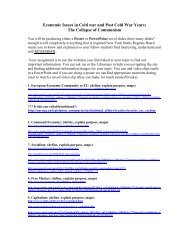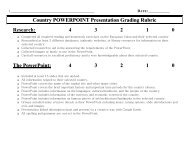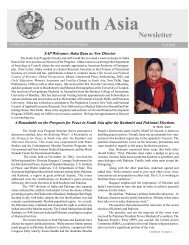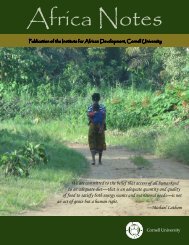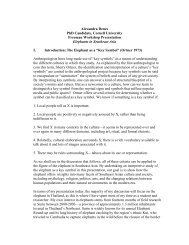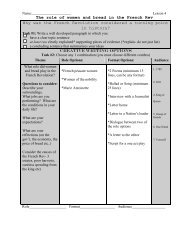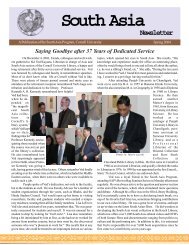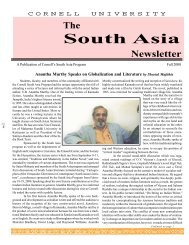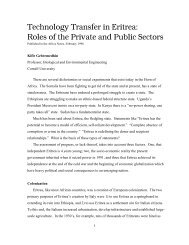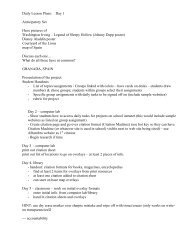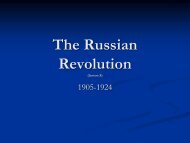Africa and the Generation of Knowledge - Institute for African ...
Africa and the Generation of Knowledge - Institute for African ...
Africa and the Generation of Knowledge - Institute for African ...
You also want an ePaper? Increase the reach of your titles
YUMPU automatically turns print PDFs into web optimized ePapers that Google loves.
<strong>Africa</strong> Notes<br />
Publication <strong>of</strong> <strong>the</strong> <strong>Institute</strong> <strong>for</strong> <strong>Africa</strong>n Development, Cornell University<br />
Fall 2012<br />
<strong>Africa</strong> <strong>and</strong> <strong>the</strong> <strong>Generation</strong> <strong>of</strong> <strong>Knowledge</strong>
<strong>Africa</strong> Notes is published four times<br />
a year by <strong>the</strong> <strong>Institute</strong> <strong>for</strong> <strong>Africa</strong>n<br />
Development, Cornell University.<br />
Contributions in <strong>the</strong> <strong>for</strong>m <strong>of</strong> articles,<br />
news items <strong>and</strong> comments are welcome<br />
from scholars, pr<strong>of</strong>essors, <strong>Africa</strong>nists<br />
<strong>and</strong> organizations. The <strong>Institute</strong> reserves<br />
<strong>the</strong> right to select or reject submissions<br />
or edit <strong>for</strong> available space. Contributions<br />
may be sent via e-mail to CIAD@cornell.<br />
edu or by mail to:<br />
Editor, <strong>Africa</strong> Notes<br />
<strong>Institute</strong> <strong>for</strong> <strong>Africa</strong>n Development<br />
190 Uris Hall<br />
Cornell University<br />
Ithaca, NY 14853<br />
tel: (607) 255-6849/5499<br />
fax: (607) 254-5000<br />
e-mail: CIAD@cornell.edu /<br />
jsb25@cornell.edu<br />
All rights reserved. Materials from<br />
this newsletter may be reproduced <strong>for</strong><br />
academic use only. All references or<br />
excerpts from this newsletter must give<br />
attribution to <strong>the</strong> <strong>Institute</strong> <strong>for</strong> <strong>Africa</strong>n<br />
Development, Cornell Unversity. All<br />
o<strong>the</strong>r uses must have authorization <strong>of</strong><br />
<strong>the</strong> <strong>Institute</strong>.<br />
Jackie Sayegh, Editor<br />
Evangeline Ray, Assistant Editor<br />
Contents<br />
<strong>Africa</strong> <strong>and</strong> <strong>the</strong> <strong>Generation</strong> <strong>of</strong> <strong>Knowledge</strong>3<br />
Muna Ndulo)<br />
Distinguished <strong>Africa</strong>nist Scholar6<br />
Upcoming Conferences.......................................... 7<br />
Publications8<br />
IAD Fellows9<br />
Humphrey Fellows11<br />
Fall 2012 Seminars: Growth, Poverty, <strong>and</strong> Inequality12<br />
<strong>Africa</strong>n Development Bank Report Launch......... 16<br />
CERIS News 17<br />
Fellowships........................................................... 18<br />
2012 Guest Lecture.............................................. 19<br />
Job Oppportunities............................................... 20<br />
Spring Symposium: Growth, Poverty, <strong>and</strong><br />
Inequality............................................................. 21<br />
2 <strong>Africa</strong> Notes<br />
Fall 2012
<strong>Africa</strong> <strong>and</strong> <strong>the</strong> <strong>Generation</strong> <strong>of</strong> <strong>Knowledge</strong><br />
Pr<strong>of</strong>essor Muna Ndulo’s Remarks Accepting <strong>the</strong><br />
NYASA Distinguished <strong>Africa</strong>nist Award<br />
<strong>Africa</strong> Forum<br />
Thank you so much <strong>for</strong> <strong>the</strong> kind introduction.<br />
Listening to it, I was reminded<br />
<strong>of</strong> how lucky we in academia<br />
are, sharing knowledge <strong>and</strong> helping<br />
to solve problems that afflict mankind.<br />
We are also very <strong>for</strong>tunate that<br />
by <strong>and</strong> large we are paid to do things<br />
we really enjoy. NYASA’s <strong>the</strong>me this<br />
year is an appropriate one: <strong>Africa</strong>ns<br />
in <strong>the</strong> Americas <strong>and</strong> <strong>Africa</strong>n-Americans<br />
in <strong>Africa</strong>: The Shifting Boundaries <strong>of</strong><br />
Citizenship in <strong>the</strong> 21st Century. This<br />
<strong>the</strong>me emphasizes <strong>the</strong> incontrovertible<br />
truth that <strong>the</strong> lives <strong>of</strong> <strong>Africa</strong>ns <strong>and</strong><br />
<strong>Africa</strong>n-Americans are intertwined.<br />
Working toge<strong>the</strong>r, we can achieve<br />
great things <strong>for</strong> all our people, whe<strong>the</strong>r<br />
in <strong>the</strong> Diaspora or in <strong>Africa</strong>.<br />
In my remarks I would like to<br />
focus on <strong>the</strong> generation <strong>of</strong> knowledge<br />
<strong>and</strong> how it affects <strong>Africa</strong>. In a<br />
recent speech at <strong>the</strong> University <strong>of</strong><br />
Stellenbosch, <strong>for</strong>mer President <strong>of</strong><br />
South <strong>Africa</strong> Thabo Mbeki observed<br />
that “<strong>for</strong> centuries <strong>the</strong> struggle to<br />
define <strong>Africa</strong> has, in addition to <strong>the</strong><br />
deadly dialogues <strong>of</strong> arms, been a<br />
contest among different schools <strong>of</strong><br />
thought <strong>and</strong> <strong>the</strong>re<strong>for</strong>e a clash <strong>of</strong> ideas.”<br />
I would like to add that <strong>the</strong>re has also<br />
been a bitter struggle <strong>for</strong> knowledge<br />
<strong>and</strong> <strong>the</strong> creation <strong>of</strong> knowledge—<strong>the</strong><br />
control <strong>of</strong> what we know <strong>and</strong> what<br />
we think we know about <strong>Africa</strong> <strong>and</strong><br />
<strong>the</strong> <strong>Africa</strong>n diaspora. In his book The<br />
Education <strong>of</strong> <strong>the</strong> British Protected Child,<br />
Achebe wrote, “to answer oppression<br />
with appropriate resistance requires<br />
knowledge <strong>of</strong> two kinds: in <strong>the</strong> first<br />
place, self-knowledge by <strong>the</strong> victim,<br />
which means awareness that oppression<br />
exists, awareness that <strong>the</strong> victim<br />
has fallen from a great height <strong>of</strong> glory<br />
or promise into <strong>the</strong> present depths;<br />
secondly, <strong>the</strong> victim must know who<br />
<strong>the</strong> enemy is. He must know his oppressor’s<br />
real name, not an alias.”<br />
The world is truly a peculiar place<br />
right now. We have both <strong>the</strong> phenomenal<br />
capacity to solve problems <strong>and</strong><br />
to really mess things up. The great<br />
advances in technology have come<br />
with greater capacity to produce <strong>and</strong><br />
control knowledge <strong>for</strong>mation <strong>and</strong><br />
to distribute it rapidly. In his speech<br />
Mbeki stated that it is self-evident<br />
that “knowledge,” regardless <strong>of</strong> <strong>the</strong><br />
philosophical debates about its meaning,<br />
<strong>and</strong> indeed because <strong>of</strong> this, has<br />
established itself as a critical driver<br />
with regard to <strong>the</strong> human objective to<br />
achieve <strong>the</strong> betterment <strong>of</strong> society. He<br />
asks <strong>the</strong> following questions:<br />
Is <strong>the</strong>re an objective social existence<br />
described as “objective reality” that exists<br />
independent <strong>of</strong> <strong>and</strong> outside <strong>of</strong> individual<br />
human consciousness <strong>and</strong> cognition <strong>and</strong><br />
is <strong>the</strong>re<strong>for</strong>e in principle freely accessible to<br />
all who seek it<br />
In reality, does everybody have <strong>the</strong><br />
freedom to access this knowledge about<br />
this supposed objective reality <strong>and</strong><br />
Does <strong>the</strong> possibility not exist that<br />
some in society could have such control<br />
over <strong>the</strong> ways <strong>and</strong> means <strong>and</strong> possibility<br />
<strong>of</strong> accessing this “knowledge” that <strong>the</strong>y<br />
determine both who knows what <strong>and</strong> what<br />
society in general “knows” <strong>and</strong> believes to<br />
constitute an “objective reality.”<br />
<strong>Africa</strong> is <strong>the</strong> most stereotyped <strong>and</strong><br />
maligned continent <strong>and</strong> its people<br />
<strong>the</strong> most misrepresented. It has faced<br />
many developmental challenges, <strong>and</strong><br />
what we know <strong>and</strong> how we know it is<br />
very important <strong>for</strong> <strong>Africa</strong>.<br />
But now it is also important to note<br />
that <strong>Africa</strong>’s <strong>for</strong>tunes are looking up.<br />
Ten years ago <strong>the</strong> Economist declared<br />
<strong>Africa</strong> <strong>the</strong> “hopeless continent.” Late<br />
last year, <strong>the</strong> same journal titled <strong>the</strong><br />
continent “<strong>Africa</strong> Rising.” In fact, in Le<br />
Monde Diplomatique (January 2012), <strong>the</strong><br />
Senegalese economist Sanou Mbaye<br />
explained that between 2011 <strong>and</strong> 2015,<br />
seven <strong>of</strong> <strong>the</strong> ten countries (<strong>the</strong> o<strong>the</strong>rs<br />
being China, India <strong>and</strong> Vietnam)<br />
positioned to show <strong>the</strong> highest growth<br />
rate in <strong>the</strong> world (around 7 percent)<br />
are in sub-Saharan <strong>Africa</strong>: Ethiopia,<br />
Mozambique, Tanzania, Congo,<br />
Ghana, Zambia, <strong>and</strong> Nigeria. These<br />
predictions are confirmed by <strong>the</strong><br />
World Bank Report that six <strong>of</strong> <strong>the</strong>se<br />
countries will, in <strong>the</strong> next six years,<br />
no longer be developing countries<br />
but will graduate to middle income<br />
countries.<br />
The China/<strong>Africa</strong> issue is one that<br />
exposes <strong>the</strong> dilemma <strong>of</strong> what we know<br />
<strong>and</strong> what we think we know as well<br />
as how knowledge is manipulated by<br />
those in control <strong>of</strong> its production. This<br />
issue can also be used to illustrate <strong>the</strong><br />
dangerous possibility that some in<br />
our society control access to “knowledge”<br />
such that <strong>the</strong>y determine who<br />
knows what, what society in general<br />
knows, <strong>and</strong> what society believes to<br />
constitute an accurate appreciation <strong>of</strong><br />
objective reality. The myths that have<br />
been put <strong>for</strong>th about China <strong>and</strong> <strong>Africa</strong><br />
include <strong>the</strong> following: 1) China is a<br />
new donor in <strong>Africa</strong> (not withst<strong>and</strong>ing<br />
<strong>the</strong> fact that in 1975 China had aid<br />
programs in more <strong>Africa</strong>n countries<br />
than USAID); 2) Chinese aid is huge; 3)<br />
China uses aid to get access to resources;<br />
4) China underpays workers; <strong>and</strong><br />
5) China is recolonizing <strong>Africa</strong>. There<br />
seems to be a constant attempt to pres-<br />
Fall 2012<br />
<strong>Africa</strong> Notes<br />
3
ent China’s expansion as a “threat” to<br />
<strong>the</strong> global economy, as though China<br />
is a parasitic influence on its trading<br />
partners.<br />
The reality is that Chinese investments<br />
in <strong>Africa</strong> can be broken into<br />
three types: 1) investments aimed at<br />
supplying China with raw materials<br />
such as oil <strong>and</strong> minerals; 2) investments<br />
aimed at <strong>Africa</strong>n markets; <strong>and</strong><br />
3) investments that aim at supplying<br />
international markets such as <strong>the</strong> EU<br />
<strong>and</strong> <strong>the</strong> U.S. by taking advantage <strong>of</strong><br />
<strong>the</strong> low labor costs <strong>and</strong> favorable trade<br />
access given to <strong>Africa</strong>n countries in<br />
those markets.<br />
There are two problems with<br />
“knowledge” <strong>and</strong> <strong>the</strong> China/<strong>Africa</strong><br />
debate. First, <strong>the</strong> discourse on <strong>the</strong>se<br />
developments is not framed in a comparative<br />
manner, <strong>and</strong> second, “knowledge”<br />
aout <strong>the</strong> issues is manipulated<br />
to control what people believe. What<br />
are <strong>the</strong> facts It is true 1) that China/<br />
<strong>Africa</strong> links are growing; 2) that<br />
Chinese investment in <strong>and</strong> trade with<br />
<strong>Africa</strong> is on <strong>the</strong> rise; 3) that China’s<br />
migration to <strong>Africa</strong> is growing, <strong>and</strong> 4)<br />
that Chinese goods are flooding <strong>the</strong><br />
<strong>Africa</strong>n market.<br />
The history <strong>of</strong> China <strong>and</strong> <strong>Africa</strong><br />
has been well documented. Richard<br />
Dowden’s book <strong>Africa</strong>: Altered States,<br />
Ordinary Miracles (Portobello, 2008)<br />
dates <strong>Africa</strong>n-Chinese relations to<br />
1414, when Zheng He <strong>the</strong> Gr<strong>and</strong><br />
Eunuch <strong>of</strong> <strong>the</strong> three treasures (along<br />
with 30 thous<strong>and</strong> soldiers) made <strong>the</strong><br />
first <strong>of</strong> seven voyages westward to<br />
<strong>Africa</strong>. In <strong>the</strong> 1960s <strong>and</strong> ‘70s China-<br />
<strong>Africa</strong> relations revolved around ideology<br />
<strong>and</strong> liberation struggles.<br />
We are told, <strong>for</strong> instance, that<br />
China’s total trade with <strong>Africa</strong> has<br />
risen considerably since 2008 <strong>and</strong><br />
now hovers at around US$120 billion.<br />
However, that figure does not<br />
tell us much unless we compare it<br />
to <strong>Africa</strong>n trade with o<strong>the</strong>r developed<br />
nations, <strong>for</strong> it ought to be noted<br />
that China-<strong>Africa</strong> trade amounts to<br />
only 2 percent <strong>of</strong> total <strong>Africa</strong>n trade.<br />
Deborah Brautigam in The Dragon’s<br />
Gift: <strong>the</strong> Real Story <strong>of</strong> China in <strong>Africa</strong><br />
has pointed out that most observers<br />
believe China’s firms dominate<br />
<strong>Africa</strong>n economies. The presumption<br />
does not fit <strong>the</strong> facts. About 90 percent<br />
<strong>of</strong> <strong>the</strong> stock <strong>of</strong> <strong>for</strong>eign direct investment<br />
(FDI) in <strong>Africa</strong> still originates<br />
from Western European companies,<br />
especially those in <strong>the</strong> EU <strong>and</strong> <strong>the</strong> U.S.<br />
Those making presumptive statements<br />
about China’s dominance do not <strong>of</strong>fer<br />
comparative figures in terms <strong>of</strong> what<br />
China is investing in Latin America,<br />
Asia or Australia. There is also <strong>the</strong><br />
belief that <strong>the</strong> Chinese are investing<br />
predominantly in natural resources.<br />
But in fact Chinese firms are increasing<br />
<strong>the</strong>ir investments in o<strong>the</strong>r sectors<br />
such as telecommunications, financial<br />
services, food processing, farming,<br />
<strong>and</strong> manufacturing. For example, one<br />
<strong>of</strong> China’s biggest stakes is actually in<br />
<strong>the</strong> St<strong>and</strong>ard Chartered Bank <strong>of</strong> South<br />
<strong>Africa</strong>, where in 2007 China bought<br />
a 20 percent stake at $5.5 billion.<br />
Ano<strong>the</strong>r fact generally omitted is that<br />
not all Chinese activity in <strong>Africa</strong> is<br />
investment. As a member <strong>of</strong> <strong>the</strong> World<br />
Bank <strong>and</strong> <strong>the</strong> <strong>Africa</strong>n Development<br />
Bank (ADB), China has won numerous<br />
tenders in competitive bidding in<br />
World Bank-funded projects. China<br />
has also participated in privately funded<br />
construction. It may be true that 26<br />
percent <strong>of</strong> China’s oil requirements are<br />
supplied by <strong>Africa</strong> at <strong>the</strong> moment (<strong>and</strong><br />
this is bound to grow in time), but we<br />
need to remember that sub-Saharan<br />
<strong>Africa</strong>n oil exports to China amount to<br />
only 9 percent <strong>of</strong> total sub-Saharan oil<br />
exports worldwide. On <strong>the</strong> o<strong>the</strong>r h<strong>and</strong>,<br />
<strong>the</strong> 37 percent <strong>of</strong> <strong>Africa</strong>n oil that goes<br />
to <strong>the</strong> U.S. is generally not questioned.<br />
The focus on China’s enterprises<br />
raises a serious question about<br />
knowledge. A story in <strong>the</strong> German<br />
daily Frankfurter Rundschau stated that<br />
“Chinese investments in Ethiopia are<br />
focused on farming <strong>for</strong> export” <strong>and</strong><br />
commented that this could lead to major<br />
social conflicts in <strong>Africa</strong> as small<br />
farmers have <strong>the</strong>ir l<strong>and</strong> <strong>and</strong> thus <strong>the</strong>ir<br />
livelihoods taken away. Certainly, l<strong>and</strong><br />
grabs are a bad thing. But does China<br />
even have agricultural investments<br />
in Ethiopia Not according to a newly<br />
released “l<strong>and</strong> grab” study by <strong>the</strong><br />
progressive Cali<strong>for</strong>nia-based Oakl<strong>and</strong><br />
<strong>Institute</strong>. In its June, 2011 report on<br />
Ethiopia, <strong>the</strong> <strong>Institute</strong> found that<br />
“while China has been active in mining<br />
<strong>and</strong> infrastructure development<br />
sectors, <strong>the</strong>y were surprisingly absent<br />
from l<strong>and</strong> investments deals.”<br />
In June, 2011, Voice <strong>of</strong> America aired<br />
a story titled “China Supports Global<br />
Pariahs, Gets Resources <strong>and</strong> Criticism<br />
in Return” as part <strong>of</strong> its series on<br />
China’s overseas engagement. Some <strong>of</strong><br />
<strong>the</strong> balanced analysts quoted included<br />
Greg Autry, Economics Pr<strong>of</strong>essor at<br />
<strong>the</strong> University <strong>of</strong> Cali<strong>for</strong>nia, Irvine,<br />
toge<strong>the</strong>r with Autry’s co-author, Peter<br />
Navarro, <strong>of</strong> <strong>the</strong> book Death by China:<br />
Confronting <strong>the</strong> Dragon. Navarro is<br />
“<strong>Knowledge</strong>,” regardless <strong>of</strong> <strong>the</strong> philosophical debates about<br />
its meaning, has established itself as a critical driver with regard to<br />
<strong>the</strong> human objective to achieve <strong>the</strong> betterment <strong>of</strong> society.<br />
also an economics pr<strong>of</strong>essor at Irvine<br />
<strong>and</strong> author <strong>of</strong> <strong>the</strong> polemic The Coming<br />
China Wars. “Zimbabwe has everything<br />
from diamonds to tobacco <strong>and</strong><br />
farm l<strong>and</strong>,” says Navarro. “China<br />
has gone in <strong>the</strong>re, <strong>and</strong> <strong>the</strong>re are a<br />
lot <strong>of</strong> Chinese farmers now tilling<br />
Zimbabwean soil, growing crops that<br />
are sent back to China while <strong>the</strong> people<br />
<strong>of</strong> Zimbabwe starve.” As Deborah<br />
Brautigam observes: “There is a lot to<br />
be critical <strong>of</strong> in China’s engagement<br />
with Mugabe, but sending in a lot <strong>of</strong><br />
Chinese farmers to till <strong>the</strong> soil is not<br />
one <strong>of</strong> <strong>the</strong>m.”<br />
I am not suggesting that China’s<br />
involvement in <strong>Africa</strong> is not without<br />
problems. There are issues about employment<br />
practices <strong>and</strong> health st<strong>and</strong>ards,<br />
<strong>for</strong> example. It is also true that<br />
China has a policy <strong>of</strong> non-interference<br />
in internal affairs, which can result in<br />
indifference to human rights violations.<br />
But to suggest that <strong>Africa</strong>n dicta-<br />
4 <strong>Africa</strong> Notes<br />
Fall 2012
tors exist because <strong>of</strong> China is being<br />
disingenuous. <strong>Africa</strong> has governance<br />
challenges it must tackle if sustainable<br />
development is to be achieved. Some<br />
<strong>of</strong> <strong>Africa</strong>’s dictators have been in place<br />
since long be<strong>for</strong>e China emerged as a<br />
major investor on <strong>the</strong> continent.<br />
Availability <strong>of</strong> capital in <strong>Africa</strong> is a<br />
major constraint to economic development,<br />
which is achieved through <strong>the</strong><br />
productive employment <strong>of</strong> labor <strong>and</strong><br />
full utilization <strong>of</strong> natural resources.<br />
China’s strong growth <strong>and</strong> hunger <strong>for</strong><br />
raw materials such as minerals have<br />
provided <strong>the</strong> foundation <strong>for</strong> sharp<br />
rises in commodity prices over <strong>the</strong><br />
past decade. What we should be concerned<br />
with is that <strong>Africa</strong>n states do<br />
not squ<strong>and</strong>er <strong>the</strong>se earnings through<br />
corruption but instead take advantage<br />
<strong>of</strong> <strong>the</strong> opportunity to use <strong>the</strong> earnings<br />
to diversify <strong>Africa</strong>n economies.<br />
Investors from everywhere in <strong>the</strong><br />
world behave <strong>the</strong> same way. They seek<br />
to maximize pr<strong>of</strong>it—<strong>and</strong> <strong>the</strong>y are not<br />
philantrophists.<br />
Returning to my <strong>the</strong>me <strong>of</strong> knowledge,<br />
by telling <strong>the</strong> story <strong>of</strong> China I<br />
am endeavoring to show that we as<br />
<strong>Africa</strong>n scholars from both <strong>Africa</strong> <strong>and</strong><br />
<strong>the</strong> diaspora need to underst<strong>and</strong> <strong>the</strong><br />
critical importance <strong>of</strong> knowledge to<br />
<strong>the</strong> development <strong>of</strong> <strong>Africa</strong>. To quote<br />
Mbeki again: “in important respects,<br />
knowledge has become ever less<br />
democratized <strong>and</strong> ever more compromised<br />
as an instrument <strong>for</strong> <strong>the</strong><br />
betterment <strong>of</strong> society.” We need to be<br />
concerned about <strong>the</strong> following: How<br />
do we promote <strong>the</strong> democratization<br />
<strong>of</strong> knowledge How do we contribute<br />
to <strong>the</strong> production <strong>of</strong> knowledge<br />
that contributes to <strong>the</strong> establishment<br />
<strong>of</strong> objective truth <strong>and</strong> gives accurate<br />
in<strong>for</strong>mation about our continent <strong>and</strong><br />
our communities<br />
Universities <strong>and</strong> research institutions<br />
are important players in <strong>the</strong><br />
creation <strong>of</strong> knowledge. NYASA should<br />
seek to be a knowledge management<br />
system. It should seek to share knowledge,<br />
skills, experiences, reflections,<br />
conceptual frameworks, <strong>and</strong> publications.<br />
It should provide a plat<strong>for</strong>m <strong>for</strong><br />
sharing knowledge. It should bring<br />
<strong>the</strong> capacity <strong>of</strong> diasporan communities<br />
within reach <strong>of</strong> <strong>Africa</strong> through knowledge<br />
networks. Capacity-building<br />
is a process involving <strong>the</strong> building,<br />
utilization, retention, <strong>and</strong> nurturing <strong>of</strong><br />
human skills, institutions, <strong>and</strong> knowledge.<br />
With such a vision, let us all rededicate<br />
ourselves to <strong>the</strong> building <strong>of</strong> a<br />
prosperous <strong>Africa</strong> in connection with<br />
its diaspora. Thank you.<br />
Muna Ndulo is Pr<strong>of</strong>essor <strong>of</strong> Law at Cornell University <strong>and</strong> Director <strong>of</strong> Cornell University’s <strong>Institute</strong> <strong>for</strong> <strong>Africa</strong>n Development<br />
(IAD). He is also Honorary Pr<strong>of</strong>essor <strong>of</strong> Law, University <strong>of</strong> Cape Town, South <strong>Africa</strong>. He is editor <strong>of</strong> Democratic Re<strong>for</strong>m in <strong>Africa</strong>:<br />
It’s Impact on Governance <strong>and</strong> Poverty Alleviation (Ohio University Press <strong>and</strong> James Currey Publishers, Ox<strong>for</strong>d, UK) <strong>and</strong><br />
Comparative Constitutionalism <strong>and</strong> Good Governance: An Eastern <strong>and</strong> Sou<strong>the</strong>rn <strong>Africa</strong>n Perspective (with John Hatchard &<br />
Peter Slinn, Cambridge University Press).<br />
Fall 2012<br />
<strong>Africa</strong> Notes<br />
5
IAD Distinguished <strong>Africa</strong>nist Scholar, Fall 2012<br />
Altering Sites <strong>and</strong> Lenses: Reflections<br />
on Gender Activism in Botswana<br />
Godisang Mookodi<br />
Senior Lecturer, Department <strong>of</strong> Sociology, University <strong>of</strong> Botswana<br />
Godisang Mookodi, Senior Lecturer in <strong>the</strong> Department <strong>of</strong> Sociology at <strong>the</strong> University <strong>of</strong> Botswana <strong>and</strong> Chair <strong>of</strong><br />
<strong>the</strong> Proposal Development Committee to establish a Gender Research Center at <strong>the</strong> University, visited Cornell as IAD’s<br />
Distinguished <strong>Africa</strong>nist Scholar <strong>for</strong> 2012. She spoke on <strong>the</strong> topic “Altering Sites <strong>and</strong> Lenses: Reflections on Gender<br />
Activism in Botswana” on November 5.<br />
Be<strong>for</strong>e coming to <strong>the</strong> University <strong>of</strong> Botswana, Dr. Mookodi was <strong>the</strong> Liaison Officer <strong>for</strong> <strong>the</strong> Botswana Chapter <strong>of</strong> <strong>the</strong><br />
Organization <strong>of</strong> Social Science Research in Sou<strong>the</strong>rn <strong>and</strong> Eastern <strong>Africa</strong> (OSSREA). Her research focuses on development,<br />
gender <strong>and</strong> sexuality, <strong>and</strong> <strong>the</strong> family. Her current research has to do with <strong>the</strong> roles <strong>of</strong> gender <strong>and</strong> politics in streng<strong>the</strong>ning<br />
research capacity in <strong>Africa</strong>, with a strategic focus on <strong>the</strong> lives <strong>of</strong> women (a project coordinated by <strong>the</strong> <strong>Africa</strong> Gender<br />
<strong>Institute</strong>).<br />
She is <strong>the</strong> author (with S. Kapunda) <strong>of</strong> The HIV/AIDS Challenge in <strong>Africa</strong>: An Impact Assessment (OSSREA, 2007); <strong>and</strong> she<br />
is co-editor <strong>of</strong> HIV/AIDS, Vulnerable Groups, Human Rights <strong>and</strong> Development in Botswana (OSSREA, 2009). In addition, she has<br />
published numerous articles in refereed journals including The Botswana Review <strong>of</strong> Ethics, Law <strong>and</strong> HIV/AIDS; <strong>the</strong> Botswana<br />
Journal <strong>of</strong> <strong>Africa</strong>n Studies; <strong>and</strong>, <strong>the</strong> <strong>Africa</strong>n Sociological Review. One such article is “The Dynamics <strong>of</strong> Domestic Violence<br />
against Women in Botswana” which asserts that “gender inequality is characterised by unequal power relations between<br />
women <strong>and</strong> men. One <strong>of</strong> <strong>the</strong> key manifestations <strong>of</strong> <strong>the</strong>se unequal power relations is violence. Studies conducted in<br />
Botswana indicate that actual violence <strong>and</strong> threats <strong>of</strong> violence against women severely hamper <strong>the</strong> achievement <strong>of</strong> gender<br />
equality. “ Dr. Mookodi earned a Ph.D. in Sociology from <strong>the</strong> University <strong>of</strong> Toronto. Pr<strong>of</strong>. Mookodi’s lecture in<strong>for</strong>mation is<br />
below:<br />
6 <strong>Africa</strong> Notes<br />
Fall 2012
Upcoming Conferences<br />
Liberian Studies Association 45th Annual Conference<br />
April 7–9, 2013, Rutgers University<br />
The Human Aspects <strong>of</strong> Development in Liberia: Steps, Strategies, <strong>and</strong> Sustainability<br />
The Liberian Studies Association welcomes proposals <strong>for</strong> papers on social <strong>and</strong> political factors that affect development<br />
planning <strong>and</strong> implementation <strong>and</strong> on social <strong>and</strong> political changes that result from development endeavors. Proposals<br />
should be no more than one page (single-spaced, 200–300 words) <strong>and</strong> must include <strong>the</strong> name, title, <strong>and</strong> institutional or<br />
organizational affiliation <strong>and</strong> full contact details <strong>of</strong> <strong>the</strong> author or authors. Deadline <strong>for</strong> proposals/abstracts is January 15,<br />
2013. Registration is required to attend <strong>and</strong> present papers at <strong>the</strong> conference. General Registration is $100.00 / Student<br />
Registration, $50.00. There will also be on-site registration. All abstracts should be sent to: 45th LSA Abstract Review<br />
Committee, c/o Jackie Sayegh, 190 Uris Hall, Cornell University, Ithaca, NY 14853 / jsb25@cornell.edu.<br />
<strong>Africa</strong> Conference at <strong>the</strong> University <strong>of</strong> Texas 2013<br />
Social Movements, Religion, <strong>and</strong> Political Expression in <strong>Africa</strong><br />
March 29–31, 2013, University <strong>of</strong> Texas at Austin<br />
Scholars are invited to submit papers <strong>and</strong> panel recommendations <strong>for</strong> <strong>the</strong> 2013 <strong>Africa</strong> Conference on Social<br />
Movements, Religion, <strong>and</strong> Political Expression in <strong>Africa</strong>. <strong>Africa</strong> is among <strong>the</strong> most socially <strong>and</strong> culturally<br />
diverse continents in <strong>the</strong> world <strong>and</strong> has traditionally been an economic <strong>and</strong> cultural highway between Europe<br />
<strong>and</strong> <strong>the</strong> Middle East. The deadline <strong>for</strong> submitting paper proposals is November 30, 2012. Proposals should include:<br />
a 250-word abstract <strong>and</strong> title <strong>and</strong> details about <strong>the</strong> author(s). Please submit all abstracts to: Toyin Falola,<br />
toyin.falola@mail.utexas.edu, <strong>and</strong> Lady Jane Acquah <strong>and</strong> Ryan Groves, africaconference2013@gmail.com. A<br />
m<strong>and</strong>atory non-refundable registration fee <strong>of</strong> $150 must be paid immediately when an abstract is accepted.<br />
Graduate students pay a reduced fee <strong>of</strong> $100. For more in<strong>for</strong>mation, visit <strong>the</strong> site: http://www.utexas.edu/cola/<br />
orgs/2013africa-conference/Call-<strong>for</strong>-Papers.php.<br />
<strong>Africa</strong>n Literature Association<br />
Literature, Liberation, <strong>and</strong> Law<br />
March 20–24, 2013, Charleston, South Carolina<br />
The conference <strong>the</strong>me “Literature, Liberation, <strong>and</strong> <strong>the</strong> Law,” seeks papers that explore <strong>the</strong> manner <strong>and</strong> extent<br />
to which writing--whe<strong>the</strong>r in statute books or in literature—can bring about liberation. Visit <strong>the</strong> site: http://<br />
www.africanlit.org/ <strong>for</strong> more in<strong>for</strong>mation.<br />
New York <strong>Africa</strong>n Studies Association 38th Annual Meeting<br />
Global <strong>Africa</strong>, Triple Heritage, <strong>and</strong> Pax <strong>Africa</strong>na: Looking Back <strong>and</strong> Looking Forward<br />
April 5–6, 2013, State University <strong>of</strong> New York at Binghamton<br />
Long be<strong>for</strong>e <strong>the</strong> word “globalization” entered <strong>the</strong> lexicon, <strong>the</strong> <strong>Africa</strong>n people had been “globalized” by dispersal<br />
abroad <strong>and</strong> exp<strong>and</strong>ing multiculturalism at home. <strong>Africa</strong>’s triple heritage was part <strong>of</strong> that history. For more<br />
in<strong>for</strong>mation on this conference, visit <strong>the</strong> website at http://www.nyasa.org/.<br />
Fall 2012<br />
<strong>Africa</strong> Notes<br />
7
IAD Publications<br />
The Food <strong>and</strong> Financial Crises in Sub-Saharan <strong>Africa</strong>:<br />
Origins, Outcomes <strong>and</strong> Policy Implications<br />
Edited by David R. Lee <strong>and</strong> Muna Ndulo<br />
Dramatic increases in food prices, as witnessed on a global scale in recent<br />
years, threaten <strong>the</strong> food security <strong>of</strong> hundreds <strong>of</strong> millions <strong>of</strong> <strong>the</strong> rural poor in<br />
sub-Saharan <strong>Africa</strong> alone. This book, <strong>the</strong> result <strong>of</strong> a symposium hosted by IAD<br />
in 2009, focuses on <strong>the</strong> recent food <strong>and</strong> financial crises as <strong>the</strong>y have affected<br />
<strong>Africa</strong>, illustrating <strong>the</strong> problems using country case studies that cover <strong>the</strong>ir<br />
origins, effects on agriculture <strong>and</strong> rural poverty, <strong>and</strong> underlying factors. The<br />
volume also makes recommendations as to how such crises could best be addressed<br />
in <strong>the</strong> future.<br />
Contributors include Ernest Aryeetey, Keith Fuglie, Robert Hockett, Nicole<br />
Mason, David R. Lee, William Masters, Siwa Msangi, Muna Ndulo, Kenneth R.<br />
Simler, Vera Songwe, <strong>and</strong> Keith Wiebe.<br />
Limited quantities are available from IAD at a 25 percent discount.<br />
To order send your name <strong>and</strong> mailing address with your check or money<br />
order <strong>for</strong> $120 to <strong>the</strong> <strong>Institute</strong> <strong>for</strong> <strong>Africa</strong>n Development, 190 Uris Hall, Cornell<br />
University, Ithaca NY 14853, or send an e-mail inquiry to Evangeline Ray, er26@<br />
cornell.edu. Please note we are not set up to accept credit card payment at this<br />
time.<br />
CABI / December 2011 / Hardcover / 304 Pages / 978-1-8459382-84 / £85/US$160/€120<br />
U.S. <strong>Africa</strong> Relations in <strong>the</strong> Age <strong>of</strong> Obama<br />
Thomas Kwasi Tieku<br />
As President Obama reaches <strong>the</strong> midpoint <strong>of</strong> his historic presidency, a timely<br />
examination <strong>of</strong> his approach to relations with <strong>Africa</strong> seems in order. This<br />
monograph argues that <strong>the</strong> President is maintaining <strong>the</strong> substance <strong>of</strong> post-Cold<br />
War U.S.-<strong>Africa</strong> relations but changing <strong>the</strong> style <strong>of</strong> U.S. engagement, adopting<br />
what <strong>the</strong> author calls cosmopolitan realism. Obama’s rhetoric on <strong>Africa</strong>, according<br />
to <strong>the</strong> author, mixes Clinton’s liberal cosmopolitan views with Bush’s<br />
compassionate realist narrative. Unlike previous U.S. presidents, however,<br />
Obama is refreshingly blunt about <strong>the</strong> U.S. position on key <strong>Africa</strong>n issues, <strong>and</strong><br />
his administration is placing pan-<strong>Africa</strong>n institutions <strong>and</strong> <strong>Africa</strong>n youth at <strong>the</strong><br />
heart <strong>of</strong> America’s relations with <strong>the</strong> continent. Although <strong>the</strong> change <strong>of</strong> style<br />
is welcome, however, <strong>the</strong> administration is still ignoring many major <strong>Africa</strong>n<br />
concerns <strong>and</strong> repeating past U.S. government mistakes.<br />
This monograph includes a brief history <strong>of</strong> U.S.-<strong>Africa</strong> relations between<br />
1950 <strong>and</strong> 1990; an exploration <strong>of</strong> U.S.-<strong>Africa</strong> relations during Clinton <strong>and</strong> Bush’s<br />
administrations; <strong>and</strong> a textual analysis <strong>of</strong> President Obama’s <strong>Africa</strong>n agenda in<br />
comparison to that <strong>of</strong> his predecessors. The final section identifies weaknesses<br />
<strong>of</strong> <strong>the</strong> president’s policies <strong>and</strong> areas where improvement might be mutually<br />
beneficial: pan-<strong>Africa</strong>nists <strong>and</strong> most <strong>of</strong> <strong>the</strong> <strong>Africa</strong>n Union leadership would like<br />
to see Obama move beyond rhetoric to build a genuine partnership with <strong>the</strong><br />
AU. Good working relations between <strong>the</strong> AU <strong>and</strong> <strong>the</strong> U.S. would be historic,<br />
bringing <strong>Africa</strong>n governments a step closer to making <strong>the</strong> dream <strong>of</strong> pan-<strong>Africa</strong>nism a reality.<br />
IAD No. 15 / January 2012 / paper / 68 pages / 978-0-9802223-5-7 / $12<br />
8 <strong>Africa</strong> Notes<br />
Fall 2012
IAD graduate fellows<br />
Each year <strong>the</strong> <strong>Institute</strong> <strong>for</strong> <strong>Africa</strong>n Development awards several tuition fellowships to graduate students from sub-Saharan <strong>Africa</strong>n<br />
whose fields <strong>of</strong> study center on <strong>Africa</strong>n development. C<strong>and</strong>idates must be nominated by <strong>the</strong>ir department Chair or <strong>the</strong> Director <strong>of</strong><br />
Graduate Studies. The recipients <strong>of</strong> <strong>the</strong> IAD Tuition Fellowhip <strong>for</strong> 2012-2013 are listed below:<br />
Oluyemi Adetule (Chemical<br />
Engineering/MEng./Nigeria) holds<br />
an MPH in environmental health<br />
from <strong>the</strong> University <strong>of</strong> Ibadan,<br />
where he spent three years focusing<br />
on renewable energy research.<br />
Mr. Adetule has served as <strong>the</strong><br />
president <strong>of</strong> <strong>the</strong> environmental<br />
health student association at <strong>the</strong><br />
University <strong>of</strong> Ibadan <strong>and</strong> has authored<br />
<strong>and</strong> co-authored numerous<br />
works on energy <strong>and</strong> <strong>the</strong> environment,<br />
including “Anaerobic Digestion technology: A Strategy<br />
<strong>for</strong> Combating Communicable Disease Pathogens in Cattle<br />
Waste” (with C. R. Ana) in <strong>the</strong> Environmental Health Perspective<br />
Journal. His research focuses on sustainable sewage treatment,<br />
waste management, <strong>and</strong> health impact assessment.<br />
Kukuwa Andam (Law/LLM/<br />
Ghana) is <strong>the</strong> Clerk <strong>of</strong> <strong>the</strong><br />
Chief Justice <strong>of</strong> Ghana. She<br />
has written legal opinions<br />
<strong>for</strong> Supreme Court Judges<br />
in Ghana to assist <strong>the</strong>m in<br />
writing judgments <strong>for</strong> l<strong>and</strong>mark<br />
Constitutional Cases.<br />
She currently works with<br />
Virtue Foundation, a U.S.-<br />
based NGO that has special<br />
consultative status with <strong>the</strong><br />
United Nations. Upon graduation<br />
from <strong>the</strong> Ghana School<br />
<strong>of</strong> Law, Ms. Andam worked with <strong>the</strong> largest law firm<br />
in Ghana serving as legal counsel <strong>for</strong> several multi-national<br />
corporations. Her work in <strong>the</strong> Ghanaian Legal Aid<br />
Department has fur<strong>the</strong>red her interest in human rights<br />
law. She is <strong>the</strong> co-author <strong>of</strong> a book whose proceeds were<br />
donated to a charitable organization supporting people<br />
who live with HIV/AIDS. Upon graduation she plans to<br />
return home to teach at <strong>the</strong> University <strong>of</strong> Ghana. She<br />
also plans to set up an NGO to render legal aid services<br />
to <strong>the</strong> underprivileged.<br />
Dhinakaran M. Chinappen<br />
(Biomedical Engineering/MEng/<br />
Mauritius) graduated from <strong>the</strong><br />
University <strong>of</strong> Pennsylvania<br />
in 2009, with dual degrees<br />
in Bioengineering (Bachelor<br />
<strong>of</strong> Science) from <strong>the</strong> School<br />
<strong>of</strong> Engineering <strong>and</strong> Applied<br />
Science, <strong>and</strong> in Economics<br />
(Bachelor <strong>of</strong> Arts) with a minor<br />
in Ma<strong>the</strong>matics from <strong>the</strong> School<br />
<strong>of</strong> Arts <strong>and</strong> Sciences. Thereafter,<br />
he worked in <strong>the</strong> Department <strong>of</strong> Anes<strong>the</strong>sia <strong>and</strong> Critical<br />
Care Medicine at <strong>the</strong> Children’s Hospital <strong>of</strong> Philadelphia.<br />
His neuroimaging research was on brain decrements in<br />
perinatally HIV-infected children <strong>and</strong> adolescents. At<br />
Cornell, he intends to pursue a deeper underst<strong>and</strong>ing<br />
<strong>of</strong> medical imaging as well as exp<strong>and</strong>ing his engineering<br />
skill set. During some occasional weekend nights,<br />
Dhinakaran is DJ DK (DJ-DK.com). He is also a Tae Kwon<br />
Do disciple.<br />
After completing her<br />
A-levels, Ms. Adji Dieng<br />
(Applied Statistics/MPS/<br />
Senegal) travelled to Paris<br />
to pursue preparatory<br />
classes <strong>for</strong> France’s top engineering<br />
schools at Lycée<br />
Henri IV. She was admitted<br />
to Telecom ParisTech<br />
(<strong>for</strong>merly known as Ecole<br />
Nationale Superieure des<br />
Telecommunications) <strong>and</strong><br />
specialized in Ma<strong>the</strong>matics<br />
<strong>and</strong> Computer Science. At<br />
<strong>the</strong> end <strong>of</strong> her second year at Telecom, Adji decided to do<br />
<strong>the</strong> MPS in Applied Statistics program at Cornell. After<br />
graduation, Ms. Dieng plans to work in <strong>the</strong> Financial<br />
Services industry. She enjoys traveling <strong>and</strong> has an interest<br />
in languages.<br />
Fall 2012<br />
<strong>Africa</strong> Notes<br />
9
Chidinma Ihemedu (Law/<br />
LLM/Nigeria) obtained her<br />
LLB degree from <strong>the</strong> University<br />
<strong>of</strong> Lagos, where she received<br />
awards <strong>for</strong> best student in<br />
company law <strong>and</strong> in industrial/<br />
labour law. After passing <strong>the</strong><br />
Nigerian Bar Exam in 2009,<br />
she served at <strong>the</strong> top corporate<br />
law firm <strong>of</strong> Banwo & Ighodalo<br />
<strong>for</strong> one year be<strong>for</strong>e moving<br />
to Alliance Law Firm. In her<br />
three-year practice as a corporate lawyer, she focused<br />
on corporate finance matters. She is a member <strong>of</strong> <strong>the</strong><br />
Chartered <strong>Institute</strong> <strong>of</strong> Taxation <strong>of</strong> Nigeria <strong>and</strong> served as<br />
Secretary to <strong>the</strong> Chairman <strong>of</strong> <strong>the</strong> Committee to review<br />
<strong>the</strong> Investment <strong>and</strong> Securities Act <strong>of</strong> <strong>the</strong> Securities <strong>and</strong><br />
Exchange Commission. She contributed to her firm’s<br />
weekly publications on capital markets, business <strong>and</strong><br />
investment in <strong>the</strong> Nigerian Business Day. In support<br />
<strong>of</strong> her planned career as a Corporate/Securities lawyer,<br />
Miss Ihemedu is focusing on business organization, securities<br />
regulation, <strong>and</strong> private equity at Cornell. Upon<br />
completion <strong>of</strong> her LLM, she intends to pursue her legal<br />
career in a private law firm, government institution, or<br />
international organization. She enjoys travelling, reading<br />
<strong>and</strong> watching soccer.<br />
Edward Sampa (Law/<br />
LLM/Zambia) obtained<br />
his bachelors <strong>of</strong> law degree<br />
from <strong>the</strong> University<br />
<strong>of</strong> Zambia in 2008 <strong>and</strong><br />
was admitted to <strong>the</strong><br />
Zambian Bar in 2009. Following<br />
this he worked<br />
as a Senior Associate<br />
at Chibesakunda &<br />
Company Advocates,<br />
were he was assigned<br />
to litigation <strong>and</strong> <strong>the</strong><br />
Corporate Advisory<br />
Department. As a master <strong>of</strong> laws student at Cornell,<br />
his areas <strong>of</strong> concentration include securities regulation,<br />
capital markets, corporate finance, <strong>and</strong> international<br />
commercial arbitration. Upon graduation Edward<br />
plans to return to Zambia, where he expects to go into<br />
academia <strong>and</strong> also provide corporate advisory services<br />
to <strong>the</strong> Zambian government.<br />
Ian M. Small (Agricultural<br />
Science/Zimbabwe) obtained<br />
his Bachelor’s <strong>and</strong><br />
Master’s degrees (cum<br />
laude) in Agriculture, with<br />
a focus on plant pathology<br />
<strong>and</strong> agronomy, at<br />
Stellenbosch University,<br />
South <strong>Africa</strong>. He has worked<br />
as a teaching assistant at<br />
Stellenbosch <strong>and</strong> as a visiting<br />
fellow in <strong>the</strong> Department<br />
<strong>of</strong> Plant Pathology at Cornell<br />
University. He is especially interested in integrated approaches<br />
to plant disease management, incorporating genetic,<br />
cultural, biological, <strong>and</strong> chemical control methods<br />
into safe, effective, <strong>and</strong> sustainable disease management<br />
strategies. At Cornell he plans to pursue a doctorate in<br />
plant science. His goal is to contribute to a safe, secure<br />
food supply <strong>for</strong> sou<strong>the</strong>rn <strong>Africa</strong> by advancing sustainable<br />
agricultural production through scientific research,<br />
education <strong>and</strong> leadership. He views Cornell’s College <strong>of</strong><br />
Agriculture <strong>and</strong> Life Sciences (CALS) as a hub <strong>of</strong> excellence<br />
that will provide him with <strong>the</strong> knowledge, skills,<br />
<strong>and</strong> relationships necessary to achieve his goals.<br />
Rotimi O. Ogunbiyi<br />
Bio-Medical Engineering/M.<br />
Eng/Nigeria) earned<br />
his Bachelor’s degree in<br />
BioMedical Engineering from<br />
Boston University. Prior to<br />
arriving at Cornell, he held research<br />
appointments including<br />
a project at <strong>the</strong> National<br />
<strong>Institute</strong> <strong>of</strong> Health (NIH),<br />
where he studied <strong>the</strong> passive<br />
flow <strong>of</strong> biological fluids<br />
through micr<strong>of</strong>luidic devices,<br />
<strong>and</strong> on ano<strong>the</strong>r project at <strong>the</strong> Klapperich Laboratory<br />
<strong>for</strong> Diagnostics <strong>and</strong> Appropriate Healthcare at Boston<br />
University, where he worked on a system <strong>for</strong> low-cost<br />
diagnostic tools tailored to HIV. Rotimi’s goal is to continue<br />
creating cutting-edge, low cost <strong>and</strong> sustainable<br />
medical technologies targeted towards global health<br />
applications. His current project is creating an alternatively<br />
powered blood pressure device <strong>for</strong> low-resource<br />
countries in conjunction with Welch Allyn, Inc.<br />
10 <strong>Africa</strong> Notes<br />
Fall 2012
Olayinka Omotosho (B.S., Microbiology; M.S.,<br />
Environmental Resources Management / Nigeria) is<br />
an Assistant Chief Scientific Officer at <strong>the</strong> Lagos State<br />
Environmental Protection Agency, Lagos, Nigeria. He<br />
has also been a Fellow <strong>of</strong> <strong>the</strong> Center <strong>for</strong> International<br />
Postgraduate Studies on Environmental Management<br />
(CIPSEM) in Dresden, Germany. As a Humphrey Fellow,<br />
his areas <strong>of</strong> study include sustainable solid waste management<br />
programs <strong>and</strong> options in large cities in <strong>the</strong> United<br />
States. He hopes to play an important role in shaping environmental<br />
policy <strong>and</strong> programs in Nigeria.<br />
Eddie Aupa Mothibi (B.S., General Agriculture, National<br />
University <strong>of</strong> Lesotho / Lesotho) is a Senior Horticultural<br />
Officer at <strong>the</strong> Royal Palace in Lesotho. He is also a Steering<br />
Technical Supervisor at <strong>the</strong> Koete Vegetable Project, a<br />
cooperative project on sustainable agricultural development<br />
shared by <strong>the</strong> governments <strong>of</strong> Lesotho <strong>and</strong> Thail<strong>and</strong>.<br />
During his fellowship program at Cornell, he is focusing<br />
on Principles <strong>of</strong> Vegetable Production, Field Crops, <strong>and</strong><br />
Creating <strong>the</strong> Urban Eden. He hopes to use <strong>the</strong> knowledge<br />
gained to help his country achieve sustainable vegetable<br />
production.<br />
Djibril Sarr (Ph.D., agricultural sciences / Senegal) is<br />
interested in learning <strong>the</strong> tools, practices <strong>and</strong> methods used<br />
to <strong>for</strong>mulate, implement <strong>and</strong> evaluate agricultural <strong>and</strong> food<br />
policies in developing countries. Upon returning to Senegal<br />
Humphrey Fellows<br />
The Hubert H. Humphrey Fellowship Program provides a year <strong>of</strong> pr<strong>of</strong>essional enrichment in <strong>the</strong> United States <strong>for</strong> experienced<br />
mid-career pr<strong>of</strong>essionals from selected countries throughout <strong>the</strong> world. Fellows are selected based on <strong>the</strong>ir potential <strong>for</strong><br />
leadership <strong>and</strong> <strong>the</strong>ir commitment to public service in ei<strong>the</strong>r <strong>the</strong> public or private sector. The Humphrey Fellows (<strong>Africa</strong>) <strong>for</strong><br />
2012–2013 are:<br />
he will join <strong>the</strong> ministry <strong>of</strong> agriculture, where he will help<br />
design policies that ensure food security, tackle rural poverty,<br />
<strong>and</strong> create jobs. Mr. Sarr has a Ph.D. in agricultural sciences<br />
<strong>and</strong> biological engineering <strong>and</strong> serves at <strong>the</strong> Ministry<br />
<strong>of</strong> Technical Education <strong>and</strong> Vocational Training in Senegal.<br />
Dina Ranarifidy (Madagascar) is an integrated solid<br />
waste manager specialist. She graduated in Development<br />
Economics from Sciences Po (Paris, France) <strong>and</strong> decided<br />
in 2009 to return to her home country to work on urban<br />
development programs. As a Humphrey Fellow at Cornell<br />
this year, she intends to broaden her knowledge on carbon<br />
finance management strategies <strong>and</strong> explore <strong>the</strong> opportunities<br />
<strong>of</strong> using Public/Private Partnerships (PPPs) in ef<strong>for</strong>ts to<br />
address climate change-related issues through more effective<br />
infrastructure service delivery.<br />
Herve-Joel Houango (Ivory Coast) is an Environment<br />
Specialist with <strong>the</strong> National Investment Bank. His focus is<br />
on sustainable development investment strategies to promote<br />
corporate social responsibility.<br />
Demelash Ayana (Ethiopia) is Department Head<br />
<strong>of</strong> Natural Resources Management at Debre Markos<br />
University. Mr. Ayana’s research centers on biodiversity<br />
conservation, <strong>for</strong>est management, <strong>and</strong> climate change adaptation<br />
<strong>and</strong> mitigation measures..<br />
<strong>Africa</strong>n Development Bank Young Pr<strong>of</strong>essionals’ Program<br />
The Young Pr<strong>of</strong>essionals Program (YPP) at <strong>the</strong> <strong>Africa</strong>n Development Bank aims<br />
at attracting highly qualified, motivated pr<strong>of</strong>essionals from its member countries.<br />
C<strong>and</strong>idates <strong>for</strong> <strong>the</strong> program must be committed to <strong>Africa</strong>n development <strong>and</strong> have<br />
demonstrated outst<strong>and</strong>ing academic <strong>and</strong> pr<strong>of</strong>essional achievement as well as effective<br />
team work <strong>and</strong> leadership potential.<br />
Through <strong>the</strong> YPP, <strong>the</strong> Bank aims to ensure continuity <strong>and</strong> excellence in both <strong>the</strong><br />
management <strong>of</strong> its projects <strong>and</strong> <strong>the</strong> provision <strong>of</strong> policy advice to its regional member<br />
countries. Young Pr<strong>of</strong>essionals have <strong>the</strong> opportunity to work across <strong>the</strong> continent<br />
<strong>and</strong> be at <strong>the</strong> <strong>for</strong>efront <strong>of</strong> exciting Bank initiatives that are helping to shape <strong>Africa</strong>’s<br />
future.<br />
http://www.afdb.org/en/careers/young-pr<strong>of</strong>essionals-program-ypp/<br />
Fall 2012<br />
<strong>Africa</strong> Notes<br />
11
Issues in <strong>Africa</strong>n Development Seminar Fall 2012<br />
The Paradox <strong>of</strong> Growth, Poverty, <strong>and</strong> Inequality:<br />
Confronting Social <strong>and</strong> Economic Development Challenges in <strong>Africa</strong><br />
In a message to <strong>the</strong> <strong>Africa</strong>n Union on <strong>the</strong> Occasion <strong>of</strong><br />
<strong>Africa</strong> Freedom Day, May 25, 2012, <strong>the</strong> United Nations<br />
Secretary-General Ban Ki-moon observed that <strong>Africa</strong> is<br />
a dynamic continent undergoing fundamental trans<strong>for</strong>mation.<br />
Even during <strong>the</strong> world economic crisis, <strong>Africa</strong>’s<br />
economies continued to exp<strong>and</strong>, <strong>and</strong> growth <strong>for</strong>ecasts remain<br />
positive. But social indicators such as health, education,<br />
<strong>and</strong> participation in society have made more limited<br />
progress. Inequality is <strong>of</strong>ten blamed <strong>for</strong> <strong>the</strong> poor links<br />
between economic growth <strong>and</strong> human development, but<br />
data shows that links between economic growth, inequality,<br />
<strong>and</strong> human development are less robust that <strong>of</strong>ten<br />
assumed.<br />
The growing number <strong>of</strong> success stories across <strong>Africa</strong><br />
indicates that broader social <strong>and</strong> economic progress is<br />
realistically attainable <strong>for</strong> most <strong>Africa</strong>ns. But this is predicated<br />
on <strong>the</strong> adoption <strong>and</strong> implementation <strong>of</strong> <strong>the</strong> correct<br />
strategies <strong>for</strong> economic development. The debate over<br />
growth <strong>and</strong> development <strong>and</strong> reduction <strong>of</strong> poverty is topical<br />
in <strong>Africa</strong>, as well as elsewhere in <strong>the</strong> world, <strong>and</strong> invites<br />
Cornell’s participation.<br />
The complex <strong>and</strong> multidimensional issue <strong>of</strong> development<br />
in its broadest sense is at <strong>the</strong> core <strong>of</strong> <strong>the</strong> <strong>the</strong>me<br />
<strong>and</strong> evokes a number <strong>of</strong> questions: Why does economic<br />
development not translate into human development Is<br />
<strong>Africa</strong>’s growth sustainable Some argue that a healthy<br />
economy requires <strong>the</strong> active involvement <strong>of</strong> <strong>the</strong> middle<br />
class as stakeholders, entrepreneurs, skilled workers, <strong>and</strong><br />
consumers. Supporting <strong>the</strong> emergence <strong>of</strong> a middle class,<br />
this argument maintains, requires, among o<strong>the</strong>r things,<br />
investment in human development. O<strong>the</strong>rs would argue<br />
that poverty reduction will result from improvements in<br />
rural agricultural production, while still o<strong>the</strong>rs argue that<br />
agricultural production will only improve when progressive<br />
l<strong>and</strong> re<strong>for</strong>m, which empowers women <strong>and</strong> <strong>the</strong> poor, is<br />
implemented.<br />
The debate calls on us to step back <strong>and</strong> look at <strong>the</strong><br />
comparative experiences <strong>of</strong> China, Brazil <strong>and</strong> India. In<br />
Brazil, President Lula da Silva (in <strong>of</strong>fice 2003–2010) created<br />
millions <strong>of</strong> jobs <strong>and</strong> discovered major oil fields, <strong>and</strong> <strong>the</strong><br />
country’s agricultural exports became among <strong>the</strong> largest in<br />
<strong>the</strong> world, resulting in reduced poverty. Similarly, China<br />
since <strong>the</strong> 1970s growth has fueled a remarkable increase in<br />
per capita income <strong>and</strong> a decline in <strong>the</strong> poverty rate. At <strong>the</strong><br />
same time, however, income disparities have increased. On<br />
<strong>the</strong> o<strong>the</strong>r h<strong>and</strong>, India has experienced tremendous growth<br />
but has not been as successful at <strong>the</strong> reduction <strong>of</strong> poverty<br />
<strong>and</strong> inequality.<br />
IAD hopes that this <strong>the</strong>me will allow participants to<br />
consider a variety <strong>of</strong> issues such as identification <strong>of</strong> strategies<br />
<strong>for</strong> ensuring that growth translates into improved<br />
livelihoods <strong>for</strong> people, l<strong>and</strong> re<strong>for</strong>m policies that empower<br />
<strong>the</strong> poor <strong>and</strong> l<strong>and</strong>less, <strong>and</strong> educational policies that build<br />
<strong>the</strong> capacity <strong>of</strong> youth <strong>and</strong> o<strong>the</strong>r disadvantaged communities<br />
<strong>and</strong> enable <strong>the</strong>m to participate in <strong>the</strong> economy.<br />
Realizing that it is not only government that fights hunger,<br />
but that civil society <strong>and</strong> <strong>the</strong> private sector have important<br />
roles to play as well, we hope that participants will<br />
examine <strong>the</strong> roles <strong>of</strong> all <strong>the</strong>se sectors in <strong>the</strong> eradication <strong>of</strong><br />
poverty.<br />
12 <strong>Africa</strong> Notes<br />
Fall 2012
Fall 2012 Seminar Schedule<br />
Poverty, Inequality, <strong>and</strong> Development August 30<br />
Gary Fields, Pr<strong>of</strong>essor <strong>of</strong> Economics <strong>and</strong> John P. Windmuller Chair <strong>of</strong> International <strong>and</strong> Comparative Labor, Cornell University<br />
Gary Fields teaches <strong>and</strong> conducts research in labor <strong>and</strong> development economics <strong>and</strong> has chaired <strong>the</strong> Department <strong>of</strong><br />
Labor Economics three times. After receiving his Ph.D. in economics from <strong>the</strong> University <strong>of</strong> Michigan, he became a<br />
pr<strong>of</strong>essor at Yale <strong>and</strong> six years later joined <strong>the</strong> faculty at Cornell. He has held visiting pr<strong>of</strong>essorships at <strong>the</strong> University <strong>of</strong><br />
Nairobi (Kenya), Universidad de Los Andes (Colombia), Ox<strong>for</strong>d University, University <strong>of</strong> Warwick, <strong>the</strong> London School <strong>of</strong><br />
Economics, <strong>and</strong> <strong>the</strong> Paris School <strong>of</strong> Economics. He has published more than 150 books <strong>and</strong> articles; his most recent book,<br />
Working Hard, Working Poor: A Global Journey (Ox<strong>for</strong>d University Press, 2012), discusses how <strong>the</strong> poor from around <strong>the</strong><br />
world work, how labor market policies can help <strong>the</strong> poor earn <strong>the</strong>ir way out <strong>of</strong> poverty, <strong>and</strong> what we can do to help. His<br />
current research is on income mobility <strong>and</strong> labor markets in Asia, <strong>Africa</strong>, <strong>and</strong> Latin America.<br />
Infrastructure Development <strong>and</strong> <strong>the</strong> Role <strong>of</strong> <strong>the</strong> Private Sector<br />
Muna Ndulo, Director, <strong>Institute</strong> <strong>for</strong> <strong>Africa</strong>n Development; Pr<strong>of</strong>essor <strong>of</strong> Law, Cornell September 6<br />
Muna Ndulo teaches law at Cornell University. Early in his career he was a Pr<strong>of</strong>essor <strong>of</strong> Law <strong>and</strong> later Dean <strong>of</strong> <strong>the</strong> Law<br />
School at <strong>the</strong> University <strong>of</strong> Zambia. In 1986 he joined <strong>the</strong> UN as Legal Officer <strong>for</strong> <strong>the</strong> Commission on International Trade<br />
Law <strong>and</strong> subsequently served in many capacities, including Senior Political Advisor to <strong>the</strong> Secretary General’s Special<br />
Representative to South <strong>Africa</strong> <strong>and</strong> Senior Legal Advisor on missions to East Timor, Kosovo, <strong>and</strong> Afghanistan. He has<br />
consulted on constitution-making in Kenya, Sudan, Zimbabwe <strong>and</strong> Somalia; he has also been a consultant <strong>for</strong> international<br />
organizations including <strong>the</strong> <strong>Africa</strong>n Development Bank, where he worked on <strong>the</strong> establishment <strong>of</strong> <strong>the</strong> <strong>Africa</strong>n<br />
Legal Support Facility; <strong>the</strong> ECA; <strong>the</strong> International Foundation <strong>for</strong> Electoral Systems, <strong>and</strong> <strong>the</strong> International <strong>Institute</strong> <strong>for</strong><br />
Democracy <strong>and</strong> Electoral Assistance. He recently established <strong>the</strong> Sou<strong>the</strong>rn <strong>Africa</strong>n <strong>Institute</strong> <strong>for</strong> Public Policy <strong>and</strong> Research,<br />
<strong>and</strong> he is a member <strong>of</strong> <strong>the</strong> Advisory Committee, Human Rights Watch, <strong>and</strong> Chairperson <strong>of</strong> Gender Links, a South <strong>Africa</strong>n<br />
NGO. He has published well over one hundred journal articles <strong>and</strong> fourteen books, including Power, Gender <strong>and</strong> Social<br />
Change in <strong>Africa</strong> (2009); <strong>and</strong> Comparative Constitutionalism <strong>and</strong> Good Governance in <strong>the</strong> Commonwealth: An Eastern<br />
<strong>and</strong> Sou<strong>the</strong>rn <strong>Africa</strong>n Perspective (2004).<br />
UN Peace-keeping Missions: Conflicts <strong>and</strong> Reconstruction in <strong>Africa</strong>: Lived Poverty <strong>and</strong> September 13<br />
<strong>the</strong> Fate <strong>of</strong> <strong>Africa</strong>n Democracies: Insights from <strong>the</strong> Afrobarometer<br />
Boniface Dulani, Lecturer, Political Science, University <strong>of</strong> Malawi<br />
Boniface Dulani recently completed his Ph.D. in Political Science at Michigan State University, where he was a Fulbright<br />
Scholar from 2006 to 2011. His major field at MSU was comparative politics, with a subfield in international relations. Since<br />
2011 he has been Operational Field Manager <strong>for</strong> <strong>the</strong> Afrobarometer Project, supervising <strong>the</strong> survey implementation in 35<br />
<strong>Africa</strong>n countries. He is also on <strong>the</strong> faculty <strong>of</strong> <strong>the</strong> Political <strong>and</strong> Administrative Studies Department <strong>of</strong> <strong>the</strong> University <strong>of</strong><br />
Malawi. He has published widely in international journals <strong>and</strong> has several book chapters in his areas <strong>of</strong> expertise. His<br />
research is on personal rule in <strong>Africa</strong>n politics, with a particular focus on presidential term limit rules in <strong>Africa</strong>n constitutions.Giving<br />
up <strong>the</strong> Gun: Rebel to State Trans<strong>for</strong>mation in <strong>Africa</strong>’s Great Lakes<br />
Changing Livelihoods in a Risky Environment: Some Findings from <strong>the</strong> PARIMA Data September 20<br />
John McPeak, Associate Pr<strong>of</strong>essor <strong>and</strong> Vice-Chair, Public Administration <strong>and</strong> International Affairs, Maxwell School <strong>of</strong> Citizenship<br />
<strong>and</strong> Public Affairs, Syracuse University<br />
John McPeak teaches graduate level micro- <strong>and</strong> development economics at <strong>the</strong> Maxwell School, Syracuse University.<br />
After his graduation from Saint Lawrence University, he worked <strong>for</strong> three years as a Peace Corps volunteer in Senegal.<br />
He earned a Ph.D. in agricultural economics at <strong>the</strong> University <strong>of</strong> Wisconsin-Madison, conducting field work in nor<strong>the</strong>rn<br />
Kenya that served as <strong>the</strong> basis <strong>for</strong> his dissertation. Later, as a postdoc at Cornell, he worked with <strong>the</strong> USAID /<br />
Global Livestock-CRSP-funded Pastoral Risk Management Project in Kenya. He has served as a consultant <strong>for</strong> <strong>the</strong> UK’s<br />
Department <strong>for</strong> International Development, <strong>the</strong> UNDP, <strong>and</strong> <strong>the</strong> International Livestock Research <strong>Institute</strong>. He continues to<br />
conduct research in Kenya, Ethiopia, Senegal, <strong>and</strong> Mali, largely focusing on livestock production, marketing, <strong>and</strong> livestock<br />
crop interactions. He recently published a book, Risk <strong>and</strong> Social Change in an <strong>Africa</strong>n Rural Economy: Livelihoods in<br />
Pastoralist Communities, in collaboration with Peter Little <strong>and</strong> Cheryl Doss.<br />
Fall 2012<br />
<strong>Africa</strong> Notes<br />
13
Inclusive Markets: Linking Smallholder Farmers to Supermarkets in <strong>Africa</strong> September 27<br />
Ralph D. Christy, Director, CIIFAD; Edward Mabaya, Research Associate, Dyson School <strong>of</strong> Applied Economics<br />
<strong>and</strong> Management, Cornell University<br />
Ralph D. Christy has worked as an agricultural economist in Cameroon, Jamaica, Kenya, Slovakia, <strong>and</strong> Zimbabwe. He<br />
has a Ph.D. from Michigan State University <strong>and</strong> teaches a course in Emerging Markets. He has frequently been published<br />
in <strong>the</strong> American Journal <strong>of</strong> Agricultural Economics <strong>and</strong> <strong>the</strong> Journal <strong>of</strong> Applied <strong>and</strong> Agricultural Economics, <strong>and</strong> he has been<br />
president <strong>of</strong> <strong>the</strong> American Agricultural Economics Association, associate editor <strong>of</strong> <strong>the</strong> American Journal <strong>of</strong> Agricultural<br />
Economics, <strong>and</strong> president <strong>of</strong> <strong>the</strong> Sou<strong>the</strong>rn Agricultural Economics Association.<br />
Ed Mabaya’s teaching <strong>and</strong> research interests include food marketing <strong>and</strong> distribution, commodity price analysis, <strong>and</strong><br />
<strong>the</strong> role <strong>of</strong> agricultural markets in rural economic development. A 2007 Desmond Tutu Leadership Fellow at Ox<strong>for</strong>d<br />
University, he is on <strong>the</strong> Advisory Committee <strong>for</strong> <strong>the</strong> Food Retail Industry Challenge Fund (FRICH) <strong>of</strong> DfID. Previously a<br />
research assistant at <strong>the</strong> University <strong>of</strong> Zimbabwe, he has a Ph.D. in agricultural economics from Cornell University.<br />
Tackling Poverty with Ingenuity <strong>and</strong> Innovation: Women Entrepreneurs in Urban Zimbabwe October 11<br />
Mary Johnson Osirim, Dean <strong>of</strong> Graduate Studies <strong>and</strong> Pr<strong>of</strong>essor <strong>of</strong> Sociology, Bryn Mawr College<br />
Mary Johnson Osirim has a Ph.D. from Harvard University. At Bryn Mawr, she was until recently <strong>the</strong> coordinator <strong>of</strong><br />
<strong>Africa</strong>na Studies <strong>and</strong> Faculty Diversity Liaison. Over <strong>the</strong> past 27 years, she has served in capacities including Chair <strong>of</strong><br />
<strong>the</strong> Sociology Department <strong>and</strong> Co-Director <strong>of</strong> both <strong>the</strong> Center <strong>for</strong> International Studies <strong>and</strong> <strong>the</strong> Center <strong>for</strong> Ethnicities,<br />
Communities, <strong>and</strong> Social Policy. Her teaching <strong>and</strong> research interests have focused on gender <strong>and</strong> development, race <strong>and</strong><br />
ethnic relations, immigration, <strong>and</strong> <strong>the</strong> family <strong>and</strong> economic sociology in sub-Saharan <strong>Africa</strong>. She has conducted fieldwork<br />
on entrepreneurship, <strong>the</strong> state, <strong>and</strong> NGOs in Nigeria <strong>and</strong> Zimbabwe; <strong>and</strong> she has researched <strong>the</strong> development <strong>of</strong><br />
gender studies in sub-Saharan <strong>Africa</strong>. She is <strong>the</strong> author <strong>and</strong> editor <strong>of</strong> several volumes including Enterprising Women in Urban<br />
Zimbabwe: Gender, Microbusiness <strong>and</strong> Globalization (2009). She has also authored over 30 articles <strong>and</strong> book chapters <strong>and</strong> is <strong>the</strong> receipient<br />
<strong>of</strong> numerous awards. She was on <strong>the</strong> Board <strong>of</strong> Directors <strong>for</strong> <strong>the</strong> <strong>Africa</strong>n Studies Association from 2008–2011.<br />
In<strong>for</strong>mational Empowerment or Business as Usual ICTs, Industrial Change, <strong>and</strong> Livelihoods<br />
in Tanzania October 18<br />
James T. Murphy, Associate Pr<strong>of</strong>essor <strong>of</strong> Geography, Clark University<br />
Jim Murphy received his Ph.D. in geography from <strong>the</strong> University <strong>of</strong> Florida, holds an M.A. in environmental policy, <strong>and</strong><br />
has a B.S. in chemical engineering. Following graduation he served as a Peace Corps volunteer in Malawi. His research focuses<br />
on economic development <strong>and</strong> technological change, particularly in relation to industries, cities, <strong>and</strong> livelihoods in<br />
Tanzania <strong>and</strong> Bolivia. He has developed critical insights into how global markets <strong>and</strong> value chains influence <strong>the</strong> prospects<br />
<strong>for</strong> achieving more distributive <strong>and</strong> sustainable <strong>for</strong>ms <strong>of</strong> development. He is <strong>the</strong> author (with Y. Aoyama <strong>and</strong> S. Hanson)<br />
<strong>of</strong> Key Concepts in Economic Geography (London: Sage Publications, 2010) <strong>and</strong> numerous articles in journals such as World<br />
Development, Journal <strong>of</strong> Economic Geography, <strong>and</strong> Technological Forecasting <strong>and</strong> Social Change.<br />
Emerging L<strong>and</strong> Issues in <strong>Africa</strong>n Agriculture: Implications <strong>for</strong> Food Security <strong>and</strong> Poverty<br />
Reduction Strategies October 25<br />
Thomas Jayne, Pr<strong>of</strong>essor <strong>of</strong> International Development, Michigan State University<br />
Thomas Jayne is a pr<strong>of</strong>essor in <strong>the</strong> Department <strong>of</strong> Agricultural, Food, <strong>and</strong> Resource Economics, <strong>and</strong> a member <strong>of</strong> <strong>the</strong> Core<br />
Faculty <strong>of</strong> <strong>the</strong> <strong>Africa</strong>n Studies Center at Michigan State University. His career has been devoted to promoting effective policy<br />
responses to poverty <strong>and</strong> hunger in <strong>Africa</strong>. Jayne currently resides in Lusaka, Zambia <strong>and</strong> has been involved in <strong>the</strong> creation<br />
<strong>of</strong> <strong>the</strong> Zambian managed Indaba Agricultural Policy Research <strong>Institute</strong>. He is on <strong>the</strong> editorial boards <strong>of</strong> two development<br />
journals, received a top paper award in 2004 from <strong>the</strong> International Association <strong>of</strong> Agricultural Economists, co-authored<br />
a paper (with Jacob Ricker-Gilbert) that was given <strong>the</strong> T.W. Schultz Award at <strong>the</strong> 2009 International Association <strong>of</strong> Agricultural<br />
Economists Triennial Meetings, received <strong>the</strong> 2009 Best Article Award in Agricultural Economics, <strong>and</strong> co-authored a<br />
paper awarded first prize at <strong>the</strong> 2010 tri-annual meetings <strong>of</strong> <strong>the</strong> Association <strong>of</strong> <strong>Africa</strong>n Agricultural Economists.<br />
14 <strong>Africa</strong> Notes<br />
Fall 2012
Barrington Moore in <strong>the</strong> Tropics: The Middle Class <strong>and</strong> Prospects <strong>for</strong> Liberal Democracy in <strong>Africa</strong> November 1<br />
Nicolas van de Walle, Maxwell M. Upson Pr<strong>of</strong>essor <strong>of</strong> Government, Cornell University<br />
Nic van de Walle has a Ph.D. in political science from Princeton University. His primary field within political science is<br />
comparative politics, <strong>and</strong> his research focuses on <strong>the</strong> political economy <strong>of</strong> development with a special focus on <strong>Africa</strong>, as<br />
well as on democratization <strong>and</strong> <strong>the</strong> politics <strong>of</strong> economic re<strong>for</strong>m. In addition, he has worked as a consultant <strong>for</strong> international<br />
<strong>and</strong> multilateral organizations including <strong>the</strong> World Bank, USAID, <strong>and</strong> UNDP. He is a <strong>for</strong>mer Director <strong>of</strong> Cornell’s<br />
Mario Einaudi Center <strong>for</strong> International Studies. His two most recent books are Overcoming Stagnation in Aid-Dependent<br />
Economies (Center <strong>for</strong> Global Development, 2005); <strong>and</strong> <strong>Africa</strong>n Economies <strong>and</strong> <strong>the</strong> Politics <strong>of</strong> Permanent Crisis, 1979–1999<br />
(Cambridge University Press, 2001).<br />
Property Relations <strong>and</strong> Inequality in Historical Perspective, with Case Studies from Ghana November 8<br />
Sara Berry, Pr<strong>of</strong>essor, Economic <strong>and</strong> Social History <strong>of</strong> <strong>Africa</strong>, Johns Hopkins University<br />
Sara Berry teaches courses in <strong>Africa</strong>n history <strong>and</strong> anthropology, with an emphasis on interdisciplinary approaches to <strong>the</strong><br />
study <strong>of</strong> social, economic <strong>and</strong> political change. She has published several books <strong>and</strong> numerous articles on 20th century<br />
<strong>Africa</strong>n economic <strong>and</strong> social history, agrarian change, <strong>and</strong> development studies, including Fa<strong>the</strong>rs Work <strong>for</strong> <strong>the</strong>ir Sons:<br />
Accumulation, Mobility <strong>and</strong> Class Formation in an Extended Yoruba Community (University <strong>of</strong> Cali<strong>for</strong>nia Press, 1985); No<br />
Condition is Permanent: The Social Dynamics <strong>of</strong> Agrarian Change in Sub-Saharan <strong>Africa</strong> (University <strong>of</strong> Wisconsin Press,<br />
1993); <strong>and</strong> Chiefs Know <strong>the</strong>ir Boundaries: Essays on Property, Power <strong>and</strong> <strong>the</strong> Past In Asante, 1896–1996 (Heinemann,<br />
2000). Trained initially in economics, she uses micro-historical research to promote interdisciplinary analysis <strong>of</strong> social <strong>and</strong><br />
economic trans<strong>for</strong>mation <strong>and</strong> to bring comparative <strong>and</strong> historical perspectives to bear on underst<strong>and</strong>ing contemporary<br />
<strong>Africa</strong>n political economies. Her current work uses local histories <strong>of</strong> conflict over l<strong>and</strong> to examine <strong>the</strong> historically contingent<br />
nature <strong>of</strong> claims on property <strong>and</strong> <strong>the</strong>ir roles in economic <strong>and</strong> political change; relationships between struggles over<br />
property, power <strong>and</strong> <strong>the</strong> production <strong>of</strong> history; <strong>and</strong> <strong>the</strong> changing social <strong>and</strong> economic meaning <strong>of</strong> law in colonial <strong>and</strong><br />
postcolonial <strong>Africa</strong>.<br />
<strong>Africa</strong>’s Rising: Toward Trans<strong>for</strong>mative <strong>and</strong> Inclusive Growth November 15<br />
Mwangi S. Kimenyi, Senior Fellow <strong>and</strong> Director, <strong>Africa</strong>Growth Initiative, Global Economy <strong>and</strong> Development,<br />
Brookings Institution<br />
Mwangi Kimenyi, in addition to his work at <strong>the</strong> Brookings Institution, is <strong>the</strong> Founding Executive Director <strong>of</strong> <strong>the</strong> Kenya<br />
<strong>Institute</strong> <strong>for</strong> Public Policy Research <strong>and</strong> Analysis (KIPPRA) in Nairobi <strong>and</strong> has been a faculty member <strong>of</strong> <strong>the</strong> Department<br />
<strong>of</strong> Economics at <strong>the</strong> University <strong>of</strong> Mississippi <strong>and</strong> <strong>the</strong> University <strong>of</strong> Connecticut. He is also a research associate with <strong>the</strong><br />
Center <strong>for</strong> <strong>the</strong> Study <strong>of</strong> <strong>Africa</strong>n Economies, University <strong>of</strong> Ox<strong>for</strong>d. He has been a visiting Pr<strong>of</strong>essor at <strong>the</strong> University <strong>of</strong><br />
Wisconsin-Madison <strong>and</strong> a Visiting Fellow at <strong>the</strong> Hoover Institution, Stan<strong>for</strong>d University. He has served on <strong>the</strong> Board<br />
<strong>of</strong> Directors <strong>of</strong> Equity Bank, Kenya. His undergraduate degree is from <strong>the</strong> University <strong>of</strong> Nairobi-Kenya, <strong>and</strong> he completed<br />
graduate studies at Ohio <strong>and</strong> George Mason Universities, where he obtained a Doctorate in Economics. Kimenyi’s<br />
research focuses on governance, trade <strong>and</strong> investment in <strong>Africa</strong>, U.S.-<strong>Africa</strong> relations, financial inclusion, education,<br />
<strong>and</strong> policies <strong>for</strong> economic growth <strong>and</strong> poverty reduction. He is <strong>the</strong> recipient <strong>of</strong> many honors <strong>and</strong> awards including <strong>the</strong><br />
Georgescu-Roegen Prize in Economics. He has authored/edited several books <strong>and</strong> many peer-refereed journal articles.<br />
Student Wrap Up November 29<br />
The student wrap-up has become a popular feature <strong>of</strong> <strong>the</strong> seminar series. As one student put it, “I found <strong>the</strong> [final week’s]<br />
discussion to be especially useful. The questions posed by my peers were thoughtful, stimulating <strong>and</strong> relevant. They<br />
inspired me to think critically on <strong>the</strong> issues, reflect on <strong>the</strong> <strong>the</strong>mes presented in <strong>the</strong> lectures, <strong>and</strong> take a new direction in<br />
thinking about <strong>the</strong> state <strong>of</strong> development in <strong>Africa</strong>.”<br />
Fall 2012<br />
<strong>Africa</strong> Notes<br />
15
IAD Hosts Report Launch<br />
<strong>Africa</strong>n Development Bank 2012<br />
<strong>Africa</strong>n Economic Outlook Report Launch<br />
An <strong>Africa</strong>n Development Bank Group delegation led by Chief Economist <strong>and</strong> Vice-President, Pr<strong>of</strong>essor Mtuli<br />
Ncube, <strong>and</strong> including <strong>the</strong> Director <strong>of</strong> Research (EDRE) <strong>and</strong> <strong>the</strong> Director <strong>of</strong> Human Development (OSHD), was in <strong>the</strong><br />
United States from September 25 to October 1 to launch <strong>the</strong> 2012 edition <strong>of</strong> <strong>the</strong> <strong>Africa</strong>n Economic Outlook Report in<br />
Washington, D.C. <strong>and</strong> New York.<br />
The tour began at <strong>the</strong> World Bank headquarters in<br />
Washington, D.C. on September 25, with <strong>the</strong> event being<br />
webcast live <strong>and</strong> featuring a discussion chaired by Mr.<br />
Shantayan Devaranjan, <strong>Africa</strong> Region Chief Economist<br />
<strong>for</strong> <strong>the</strong> AfDB. The Director <strong>of</strong> <strong>the</strong> Bank’s Economic<br />
Research Department, Mr. Steve Kayizzi-Murgerwa,<br />
<strong>and</strong> <strong>the</strong> Director <strong>of</strong> Human Development, Ms. Agnes<br />
Soucat, presented <strong>the</strong> findings <strong>of</strong> <strong>the</strong> report, while Ms.<br />
Louise Fox, World Bank Lead Economist, <strong>Africa</strong> Region,<br />
<strong>and</strong> Mr. Deon Filmer, World Bank Lead Economist,<br />
Development Research Group, were <strong>the</strong> discussants.<br />
A similar presentation was held on September<br />
26 at a well-attended event at <strong>the</strong> Atlantic Council in<br />
Washington, D.C. The event was jointly organized by<br />
<strong>the</strong> Atlantic Council’s Michael S. Ansari <strong>Africa</strong> Center<br />
<strong>and</strong> <strong>the</strong> <strong>Africa</strong> Growth Initiative at <strong>the</strong> Brookings<br />
<strong>Institute</strong>. The launch event took <strong>the</strong> <strong>for</strong>m <strong>of</strong> a panel<br />
discussion that was moderated by Dr. J. Peter Pham,<br />
Director <strong>of</strong> <strong>the</strong> Michael S. Ansari <strong>Africa</strong> Center.<br />
From Washington, D.C., <strong>the</strong> delegation travelled<br />
to New York to present <strong>the</strong> publication on September<br />
27 at New York University’s <strong>Africa</strong> House. The event<br />
was moderated by Pr<strong>of</strong>essor Yaw Nyarko, NYU <strong>Africa</strong><br />
House Director. The AfDB Chief Economist <strong>and</strong> Vice-<br />
President <strong>and</strong> <strong>the</strong> Director <strong>of</strong> Human Development<br />
were <strong>the</strong> guest speakers. The discussants were Pr<strong>of</strong>essor<br />
Elizabeth Asiedu, University <strong>of</strong> Kansas; Pr<strong>of</strong>essor<br />
Mwangi wa Githinji, University <strong>of</strong> Massachusetts; <strong>and</strong><br />
Dr. Hippolyte F<strong>of</strong>ack <strong>of</strong> <strong>the</strong> World Bank. Among <strong>the</strong> notable participants at <strong>the</strong> NYU launch event was Pr<strong>of</strong>essor<br />
William Easterly, Co-Director <strong>of</strong> <strong>the</strong> Development Research <strong>Institute</strong> at NYU.<br />
At Cornell University in Ithaca, New York, <strong>the</strong> AEO 2012 was launched at <strong>the</strong> <strong>Institute</strong> <strong>for</strong> <strong>Africa</strong>n Development<br />
on September 28 to a packed audience <strong>of</strong> staff <strong>and</strong> students. The event was organized by Pr<strong>of</strong>essor Muna B. Ndulo,<br />
Director <strong>of</strong> Cornell University’s <strong>Institute</strong> <strong>for</strong> <strong>Africa</strong>n Development. The report was presented by <strong>the</strong> Director <strong>of</strong> <strong>the</strong><br />
Bank’s Economic Research Department, Mr. Steve Kayizzi-Murgerwa. A distinguished panel <strong>of</strong> Cornell University<br />
scholars, including Pr<strong>of</strong>essor Chantal Thomas (Cornell Law School), Pr<strong>of</strong>essor David Sahn (Economics <strong>and</strong><br />
Nutritional Science) <strong>and</strong> Pr<strong>of</strong>essor Ralph Christy (Dyson School <strong>of</strong> Applied Economics <strong>and</strong> Management), were <strong>the</strong><br />
discussants <strong>of</strong> <strong>the</strong> report. The event was moderated by Pr<strong>of</strong>essor Chris Barrett.<br />
The final presentation on October 1 was held at <strong>the</strong> United Nations. AfDB Chief Economist <strong>and</strong> Vice-President<br />
Pr<strong>of</strong>essor Ncube presented <strong>the</strong> macroeconomic overview <strong>and</strong> <strong>the</strong> Chief Economist <strong>for</strong> UNDP’s Regional Bureau <strong>for</strong><br />
<strong>Africa</strong>; Mr. Pedro Pedro Conceição presented on Human Development.<br />
16 <strong>Africa</strong> Notes<br />
Fall 2012
Global Islam:<br />
A Workshop <strong>for</strong> Community College Faculty<br />
October 20, 2012<br />
On October 20th, Cornell’s Educational Resources <strong>for</strong> International Studies (CERIS) hosted a pr<strong>of</strong>essional<br />
development workshop <strong>for</strong> community college faculty, along with a few high school social studies teachers,<br />
called Global Islam. This one-day workshop featured Cornell <strong>and</strong> Ithaca College expertise from a range <strong>of</strong><br />
disciplines <strong>and</strong> world areas. It was an opportunity <strong>for</strong> educators to exp<strong>and</strong> <strong>the</strong>ir knowledge on Islam, <strong>and</strong><br />
Muslim societies around <strong>the</strong> world. Ten high school teachers, some from as far as Owego, <strong>and</strong> 25 community<br />
college faculty from Broome, Monroe, Corning, Onondaga, Jefferson <strong>and</strong> Tomkins-Cortl<strong>and</strong> community colleges<br />
attended.<br />
Pr<strong>of</strong>essor Eric Tagliacozzo (History) presented on Sou<strong>the</strong>ast Asians’ pilgrimage to Mecca, Pr<strong>of</strong>essor Muna<br />
Ndulo (Law discussed his work on Human Rights, Islam <strong>and</strong> <strong>the</strong> Somalia constitution, <strong>and</strong> Pr<strong>of</strong>essor Tom<br />
Pepinsky (Government) presented Democracy in <strong>the</strong> Muslim World: The Indonesian Model <strong>and</strong> <strong>the</strong> Arab<br />
Spring. Ithaca College History Pr<strong>of</strong>essor, Jason Freitag, gave a talk titled “Islam in South Asia: Culture <strong>and</strong><br />
Cooperation.”<br />
In addition to faculty presentations, <strong>the</strong> Indian novelist Sorraya Khan read from her book Five Queens<br />
Road, <strong>and</strong> community members Jing Carlson <strong>and</strong> Sarwat Ismail discussed personal experiences related to <strong>the</strong><br />
topic “Women’s Roles <strong>and</strong> Rights in Muslim Societies.” The workshop will ended with an online tour <strong>of</strong> <strong>the</strong><br />
John Henrik Clarke <strong>Africa</strong>na Library by Eric K<strong>of</strong>i Acree.<br />
This workshop was a collaboration between a numbers <strong>of</strong> programs: <strong>the</strong> Mario Einaudi Center <strong>for</strong><br />
International Studies, <strong>the</strong> Sou<strong>the</strong>ast Asia Program, <strong>the</strong> South Asia Program, <strong>the</strong> East Asia Program, <strong>and</strong><br />
<strong>the</strong> <strong>Institute</strong> <strong>for</strong> <strong>Africa</strong>n Development, The Latin American Studies Program, <strong>and</strong> <strong>the</strong> American <strong>Institute</strong><br />
<strong>for</strong> Indonesian Studies <strong>and</strong> <strong>the</strong> Comparative Muslim Societies Program. It was partially funded by <strong>the</strong> U.S.<br />
Department <strong>of</strong> Education Title VI Program.<br />
IAD Director Muna Ndulo Speakes in Ralph R. Watkins<br />
<strong>Africa</strong>n Studies Lecture Series, SUNY Oneonta<br />
IAD Director Muna Ndulo was <strong>the</strong> first speaker in <strong>the</strong> fifth annual<br />
Ralph R. Watkins <strong>Africa</strong>na Studies Lecture Series at SUNY<br />
Oneonta. Pr<strong>of</strong>essor Ndulo spoke on “Challenges <strong>of</strong> Peace Keeping:<br />
<strong>Africa</strong>n Solutions to <strong>Africa</strong>n Problems” at 7 p.m. Thursday,<br />
September 20, 2012, in <strong>the</strong> Alden Room <strong>of</strong> <strong>the</strong> college’s Milne<br />
Library. The event was open to <strong>the</strong> public.<br />
The annual lecture series honors <strong>the</strong> late Pr<strong>of</strong>essor Emeritus<br />
Ralph Watkins <strong>of</strong> <strong>the</strong> SUNY Oneonta History <strong>and</strong> <strong>Africa</strong>na <strong>and</strong><br />
Latino Studies departments. A specialist in <strong>Africa</strong>n-American<br />
<strong>and</strong> American history, Watkins taught at <strong>the</strong> college <strong>for</strong> more than<br />
30 years <strong>and</strong> served as chair <strong>of</strong> <strong>the</strong> <strong>Africa</strong>na <strong>and</strong> Latino Studies<br />
Department <strong>for</strong> more than a decade.<br />
http://aristotle.oneonta.edu/wordpress/news/2012/09/14/cornelluniversity-scholar-to-give-lecture/<br />
Fall 2012<br />
<strong>Africa</strong> Notes<br />
17
Fellowships<br />
<strong>Institute</strong> <strong>for</strong> <strong>Africa</strong>n Development Tuition Fellowship<br />
The <strong>Institute</strong> <strong>for</strong> <strong>Africa</strong>n Development has several one-year, non-renewable tuition fellowships available<br />
<strong>for</strong> graduate students from <strong>Africa</strong> to study at Cornell next year. The fellowships are awarded on a competitive<br />
basis to applicants in fields related to development. They may be used in ei<strong>the</strong>r statutory or endowed colleges <strong>of</strong><br />
<strong>the</strong> University. The fellowships do not cover travel, living, health insurance or o<strong>the</strong>r expenses associated with<br />
studying at Cornell.<br />
Nominations <strong>for</strong> fellowships <strong>for</strong> <strong>the</strong> 2012—2013 academic year should be prepared by <strong>the</strong> c<strong>and</strong>idate’s Director<br />
<strong>of</strong> Graduate Study or Department Chair <strong>and</strong> sent to <strong>the</strong> <strong>of</strong>fice <strong>of</strong> <strong>the</strong> <strong>Institute</strong> <strong>for</strong> <strong>Africa</strong>n Development (190 Uris<br />
Hall) in time <strong>for</strong> receipt by <strong>the</strong> close <strong>of</strong> business on Monday, March 25, 2013. The nomination letter from <strong>the</strong> c<strong>and</strong>idate’s<br />
department should indicate <strong>the</strong> c<strong>and</strong>idate’s strengths <strong>and</strong> relative st<strong>and</strong>ing among <strong>the</strong> students being<br />
admitted to <strong>the</strong> program <strong>for</strong> <strong>the</strong> academic year. The letter should be sent along with <strong>the</strong> c<strong>and</strong>idate’s academic<br />
folder, which should include <strong>the</strong> following: normal admission portfolio in<strong>for</strong>mation; transcripts; letters <strong>of</strong> recommendation;<br />
statement <strong>of</strong> purpose; TOEFL scores <strong>and</strong> Graduate Record Examination scores, if applicable, <strong>and</strong><br />
evidence <strong>of</strong> applicant’s citizenship in an <strong>Africa</strong>n country.<br />
Applications will be reviewed by <strong>the</strong> <strong>Institute</strong> Fellowship <strong>and</strong> Grants Committee. Fellowships will be awarded<br />
based on <strong>the</strong> following criteria: highly selective academic excellence; demonstrated leadership abilities; academic<br />
<strong>and</strong> pr<strong>of</strong>essional qualifications; need <strong>of</strong> <strong>the</strong> applicant’s country <strong>for</strong> <strong>the</strong> specialized knowledge <strong>and</strong> skills;<br />
applicant’s commitment to <strong>the</strong> advancement <strong>of</strong> development in <strong>Africa</strong>; documented evidence <strong>of</strong> prior community<br />
or civic service in <strong>the</strong> home country; quality <strong>and</strong> feasibility <strong>of</strong> <strong>the</strong> proposed plan <strong>of</strong> study or research;<br />
planned or confirmed place <strong>of</strong> work after returning to home country; English pr<strong>of</strong>iciency; <strong>and</strong> financial need.<br />
Questions should be directed to Jackie Sayegh, Program Manager, 607-255-6849/ jsb25@cornell.edu.<br />
Oppenheimer Fund scholarships<br />
The Oppenheimer Fund Scholarships are open to applicants who are ordinarily resident in South <strong>Africa</strong><br />
applying to start any new degree bearing course, with <strong>the</strong> exception <strong>of</strong> PGCert <strong>and</strong> PGDip courses, at <strong>the</strong><br />
University <strong>of</strong> Ox<strong>for</strong>d. Applicants should be intending to return to South <strong>Africa</strong> following <strong>the</strong>ir studies.<br />
Awards are usually made <strong>for</strong> <strong>the</strong> full duration <strong>of</strong> a student’s fee liability <strong>for</strong> <strong>the</strong> agreed course. If your<br />
scholarship is <strong>of</strong>fered <strong>for</strong> a course lasting more than one year, <strong>the</strong> continuation <strong>of</strong> your scholarship each year<br />
is subject to an annual renewal process based on satisfactory academic progress.<br />
http://www.ox.ac.uk/fees<strong>and</strong>funding/prospectivegrad/scholarships/university/oppenheimer/<br />
Waverley – <strong>Africa</strong>n Studies Center Joint Scholarship<br />
The Waverley Fund was established in 2001. It aims to assist academically excellent students from disadvantaged<br />
backgrounds who have shown <strong>the</strong> potential to make a significant contribution in <strong>the</strong>ir future<br />
careers. The <strong>Africa</strong>n Studies Centre was launched in October 2004 <strong>and</strong> attracts extremely high quality<br />
graduates. The Centre is a unit <strong>of</strong> <strong>the</strong> School <strong>of</strong> Interdisciplinary Area Studies (SIAS), a department in <strong>the</strong><br />
Social Sciences Division.<br />
18 <strong>Africa</strong> Notes<br />
Fall 2012
IAD Guest Lecture<br />
Rw<strong>and</strong>a as a Developmental State: A<br />
Model <strong>for</strong> Emerging <strong>Africa</strong><br />
Dr. Stephan Klingebiel<br />
Head <strong>of</strong> Department<br />
Bi- <strong>and</strong> Multilateral Development<br />
Cooperation<br />
Deutsches Institut für<br />
Entwicklungspolitik<br />
German Development <strong>Institute</strong><br />
Tuesday, November 27, 2012<br />
12:00 PM<br />
G-08 Uris Hall<br />
Open to <strong>the</strong> Public<br />
Lunch will be provided<br />
Co-sponsored by <strong>the</strong> Mario Einaudi<br />
Center <strong>for</strong> International Studies<br />
Fall 2012<br />
<strong>Africa</strong> Notes<br />
19
Job Opportunities<br />
Senior Women’s Protection <strong>and</strong> Empowerment (WPE / GBV) Coordinator, Monrovia, Liberia<br />
IRC Liberia seeks a Senior Coordinator <strong>for</strong> Women’s Protection <strong>and</strong> Empowerment to lead <strong>the</strong> development <strong>and</strong> implementation<br />
<strong>of</strong> all GBV-related projects within <strong>the</strong> Women <strong>and</strong> Girls Rebuilding Nations Program. S/he will be a member<br />
<strong>of</strong> <strong>the</strong> senior management team, with direct responsibility <strong>for</strong> managing <strong>and</strong> developing all programming related to<br />
reducing <strong>the</strong> impact <strong>of</strong> gender based violence on women <strong>and</strong> girls, reducing vulnerability to violence, increasing protection<br />
<strong>and</strong> enhancing educational <strong>and</strong> economic opportunities. IRC Liberia is currently implementing programming in<br />
four counties <strong>and</strong> will launch <strong>the</strong> second phase <strong>of</strong> <strong>the</strong> WGRN program with additional funding <strong>for</strong> three years. The successful<br />
c<strong>and</strong>idate will have a strong technical background in working with gender based violence.The senior coordinator<br />
will be expected to travel at least 30 percent <strong>of</strong> <strong>the</strong> time to IRC’s multiple field sites, currently in L<strong>of</strong>a, Nimba <strong>and</strong> Gr<strong>and</strong><br />
Gedeh counties. S/he will provide guidance <strong>and</strong> oversight to programs, supervise four direct reports <strong>and</strong> oversee a team<br />
<strong>of</strong> 30 Liberian staff. Visit <strong>the</strong> website at http://unjobs.org/vacancies/1347218575401.<br />
Logistics Coordinator, South Sudan<br />
The Logistics Coordinator (L4) is <strong>the</strong> senior logistics appointment in <strong>the</strong> Mission or Response <strong>and</strong> is responsible <strong>for</strong>,<br />
<strong>and</strong> accountable <strong>for</strong>, <strong>the</strong> delivery <strong>of</strong> all logistics <strong>and</strong> supply chain related activities in accordance with International<br />
Medical Corps Logistics policies <strong>and</strong> procedures. Fundamental to this role is <strong>the</strong> ability to manage <strong>and</strong> motivate your<br />
logistics team <strong>and</strong> engage with o<strong>the</strong>r mission or response staff, external contractors <strong>and</strong> organizations; <strong>the</strong>re<strong>for</strong>e you<br />
are required to have <strong>the</strong> skills to communicate clearly, both verbally <strong>and</strong> in writing, plan <strong>for</strong> <strong>and</strong> deliver quality presentations<br />
<strong>and</strong> training, <strong>and</strong> produce timely written reports. Visit <strong>the</strong> website <strong>for</strong> more in<strong>for</strong>mation: http://unjobs.org/<br />
vacancies/1348301237239.<br />
Finance Officer, Freedom House, Kenya<br />
Freedom House promotes <strong>the</strong> spread <strong>of</strong> freedom <strong>and</strong> democracy around <strong>the</strong> world through research, effective advocacy,<br />
<strong>and</strong> programs that support frontline activists. The Finance Officer will be responsible <strong>for</strong> financial, sub-grant <strong>and</strong><br />
administrative functions according to <strong>the</strong> regulations, policies <strong>and</strong> procedures <strong>of</strong> donors, <strong>the</strong> Kenyan government <strong>and</strong><br />
<strong>the</strong> organization in support <strong>of</strong> Freedom House’s programs in <strong>the</strong> region. This position is based in Nairobi, Kenya, <strong>and</strong><br />
reports to <strong>the</strong> Project Director, Sudan. http://www.jobs4development.com/jobs/view/1817/finance-<strong>of</strong>ficer-kenya/<br />
Child Youth Protection <strong>and</strong> Development (CYPD) Coordinator<br />
IRC Liberia seeks a Child Youth Protection <strong>and</strong> Development (CYPD) Coordinator to lead <strong>the</strong> strategic direction <strong>and</strong><br />
overall management <strong>of</strong> CYPD funded projects, including administrative supervision, budget management, grants<br />
compliance <strong>and</strong> staff development. S/he will be a member <strong>of</strong> <strong>the</strong> senior management team, with direct responsibility <strong>for</strong><br />
managing <strong>and</strong> developing all programming related to child protection, education, youth <strong>and</strong> livelihoods. The successful<br />
c<strong>and</strong>idate will have a strong technical background in <strong>the</strong> CYPD portfolio areas. S/he will have a demonstrated ability to<br />
think strategically, innovate <strong>and</strong> mentor teams. The coordinator will be expected to travel at least 30 percent <strong>of</strong> <strong>the</strong> time<br />
to IRC’s multiple field sites, currently in Monrovia, L<strong>of</strong>a, Nimba <strong>and</strong> Gr<strong>and</strong> Gedeh counties. S/he will provide guidance<br />
<strong>and</strong> oversight to programs, supervise 5 direct reports <strong>and</strong> oversee a team <strong>of</strong> 40 Liberian staff. The position reports to <strong>the</strong><br />
country director. http://ch.tbe.taleo.net/CH02/ats/careers/requisition.jsporg=IRC&cws=1&rid=8482<br />
Assistant Country Director Programs, South Sudan<br />
The Assistant Country Director Programme (ACDP) is a member <strong>of</strong> <strong>the</strong> GOAL South Sudan Senior Management Team<br />
(SMT) with overall responsibility <strong>for</strong> <strong>the</strong> strategic development <strong>of</strong> GOAL’s programmes, currently operational in four<br />
underserved locations in South Sudan. The role focuses on programme planning <strong>and</strong> development, reporting, M&E <strong>and</strong><br />
capacity building, as well as coordination internally <strong>and</strong> with relevant line ministries, UN agencies, NGOs, partners <strong>and</strong><br />
o<strong>the</strong>r relevant stakeholders. http://unjobs.org/vacancies/1347569526870<br />
20 <strong>Africa</strong> Notes<br />
Fall 2012
Spring Symposium<br />
Growth, Poverty, <strong>and</strong> Inequality:<br />
Confronting <strong>the</strong> Challenges <strong>for</strong> a Better Life <strong>for</strong> All <strong>of</strong> <strong>Africa</strong><br />
In honor <strong>of</strong> Erik Thorbecke,<br />
H.E Babcock Pr<strong>of</strong>essor Emeritus <strong>of</strong> Economics, Cornell University<br />
Sponsored by <strong>the</strong> Cornell <strong>Institute</strong> <strong>for</strong> <strong>Africa</strong>n Development (IAD) <strong>and</strong><br />
<strong>the</strong> <strong>Africa</strong>n Economic Research Consortium (AERC)<br />
April 19–20, 2013<br />
Cornell University, Ithaca, NY<br />
Call <strong>for</strong> Papers<br />
The <strong>Institute</strong> <strong>for</strong> <strong>Africa</strong>n Development at Cornell University, in collaboration with <strong>the</strong> <strong>Africa</strong>n Economic Research<br />
Consortium (AERC), will hold a conference, April 19–20, 2013, on <strong>the</strong> <strong>the</strong>me Growth, Poverty, <strong>and</strong> Inequality: Confronting <strong>the</strong><br />
Challenges <strong>for</strong> a Better Life <strong>for</strong> All in <strong>Africa</strong>.<br />
The conference is in honor <strong>of</strong> Erik Thorbecke, H.E Babcock Pr<strong>of</strong>essor Emeritus <strong>of</strong> Economics, Cornell University,<br />
<strong>for</strong> his lifelong work in <strong>the</strong> areas <strong>of</strong> economic <strong>and</strong> agricultural development, <strong>the</strong> measurement <strong>and</strong> analysis <strong>of</strong> poverty<br />
<strong>and</strong> malnutrition, <strong>the</strong> Social Accounting Matrix <strong>and</strong> general equilibrium modeling, <strong>and</strong> international economic policy.<br />
More particularly, we honor his contribution to <strong>Africa</strong>n economic development.<br />
The symposium will critically examine a variety <strong>of</strong> issues such as identification <strong>of</strong> strategies <strong>for</strong> ensuring that growth<br />
translates into improved livelihoods <strong>for</strong> people, policies <strong>and</strong> institutions that empower <strong>the</strong> poor <strong>and</strong> l<strong>and</strong>less, <strong>and</strong> educational<br />
policies that build <strong>the</strong> capacity <strong>of</strong> youth <strong>and</strong> o<strong>the</strong>r disadvantaged communities <strong>and</strong> enable <strong>the</strong>m to participate<br />
in <strong>the</strong> economy. Realizing that <strong>the</strong> fight <strong>for</strong> <strong>the</strong> eradication <strong>of</strong> poverty involves not only <strong>the</strong> government but civil society<br />
<strong>and</strong> <strong>the</strong> private sector as well, it is hoped that <strong>the</strong> symposium will include <strong>the</strong> roles <strong>of</strong> <strong>the</strong>se sectors in discussions on <strong>the</strong><br />
eradication <strong>of</strong> poverty. On a comparative note, <strong>the</strong> symposium will examine how o<strong>the</strong>r regions such as Latin America<br />
<strong>and</strong> Asia have fared <strong>and</strong> what lessons <strong>and</strong> applications are available <strong>the</strong>re <strong>for</strong> <strong>Africa</strong>.<br />
Abstract submission<br />
Interested persons are invited to submit proposals <strong>for</strong> <strong>the</strong> symposium. Proposals must be no more than a page in<br />
length, single-spaced, <strong>and</strong> must have <strong>the</strong> name, title, <strong>and</strong> institutional or organizational affiliation <strong>and</strong> full contact details<br />
<strong>of</strong> <strong>the</strong> person or persons submitting <strong>the</strong> abstract. Deadline <strong>for</strong> proposals/abstracts is November 30, 2012. Funding<br />
is available to assist presenters in paying <strong>for</strong> travel expenses <strong>and</strong> lodging at Cornell. If multiple contributors authored<br />
one abstract, IAD will assist only one contributor to travel to Cornell. As with all IAD symposia, proceedings from this<br />
symposium will be published as a book.<br />
For <strong>the</strong> full conference abstract <strong>and</strong> call <strong>for</strong> papers, visit http://iad.einaudi.cornell.edu/<br />
Fall 2012<br />
<strong>Africa</strong> Notes<br />
21
GROWTH, POVERTY, AND INEQUALITY:<br />
CONFRONTING THE CHALLENGES FOR<br />
A BETTER LIFE FOR ALL IN AFRICA<br />
(In honor <strong>of</strong> Erik Thorbecke, H.E Babcock Pr<strong>of</strong>essor Emeritus <strong>of</strong> Economics,<br />
Cornell University)<br />
April 19-20, 2013<br />
# 423 ILR Conference Center<br />
Cornell University, Ithaca, NY<br />
Organized by <strong>the</strong> <strong>Institute</strong> <strong>for</strong> <strong>Africa</strong>n Development, Cornell University,<br />
<strong>and</strong> <strong>the</strong> <strong>Africa</strong>n Economic Research Consortium (AERC)<br />
22 <strong>Africa</strong> Notes<br />
Fall 2012
Pr<strong>of</strong>essor Dotsevi Sogah (Chemical Biology) speaks with Basil<br />
Jones (Assistant to <strong>the</strong> Chief Economist <strong>and</strong> Vice President <strong>of</strong><br />
<strong>the</strong> <strong>Africa</strong>n Development Bank) at <strong>the</strong> Report Launch.<br />
Dr. Abebe Shimeles (Manager <strong>of</strong> Development Research Division, <strong>Africa</strong>n<br />
Development Bank) speaks with a student after <strong>the</strong> <strong>Africa</strong>n Economic Report<br />
Launch. Dr. Steve Kayizzi-Mugerwa (Director <strong>of</strong> Development Research)<br />
speaks with o<strong>the</strong>r attendees in <strong>the</strong> background.<br />
Boniface Dulani, <strong>for</strong>mer Fulbright Scholar <strong>and</strong> Lecturer at<br />
<strong>the</strong> University <strong>of</strong> Malawi, tours <strong>the</strong> Cornell campu after his<br />
seminar lecture.<br />
Students line up <strong>for</strong> <strong>the</strong> 5k run to benefit <strong>the</strong> Zambia Initiative<br />
Fall 2012<br />
<strong>Africa</strong> Notes<br />
23
w.einaudi.cornell.edu/<strong>Africa</strong><br />
http://iad.einaudi.cornell.edu/<br />
<strong>Institute</strong> <strong>for</strong> <strong>Africa</strong>n Development<br />
Mario Einaudi Center <strong>for</strong> International Studies<br />
190 Uris Hall<br />
Cornell University<br />
Ithaca NY 14853<br />
ciad@cornell.edu<br />
http:iad.einaudi.cornell.edu/<br />
ISSN 1551 - 8051





